23. THE TROUBLED 1970s

A "MORE MORAL" CARTER
CONTENTS
 The American Bicentennial – 1976 The American Bicentennial – 1976
 Jimmy Carter and the national elections Jimmy Carter and the national elections
of 1976
 Carter proposes a foreign policy of Carter proposes a foreign policy of
"Morality"
 The surrender of the Panama Canal The surrender of the Panama Canal
 The fall of the Shah of Iran The fall of the Shah of Iran
 Other international issues during the Other international issues during the
Carter years
 American diplomats imprisoned in Iran American diplomats imprisoned in Iran
 Drooping American morale Drooping American morale
 Volcker's "monetarism" to the rescue? Volcker's "monetarism" to the rescue?
 Other political causes continue to Other political causes continue to
advance themselves in America
The textual material on this webpage is drawn directly from my work
America – The Covenant Nation © 2021, Volume Two, pages 238-252.
THE AMERICAN BI-CENTENNIAL – 1976 |
|
1976 was the year of the Bicentennial, the 200th
anniversary of the signing of the Declaration of Independence. It
should have been a year of great celebration, of America looking back
over the past two centuries to see proudly how well the country had
done. But this was not to be. At the moment America was not feeling
very proud. Supposedly democracy had been restored. But somehow
something felt very wrong. America had lost its sense of direction, its
sense of purpose. America was on the defensive, in retreat, without any
sense of when that retreat might stop. This silent understanding was
quite evident in the lackluster bicentennial celebrations.
|
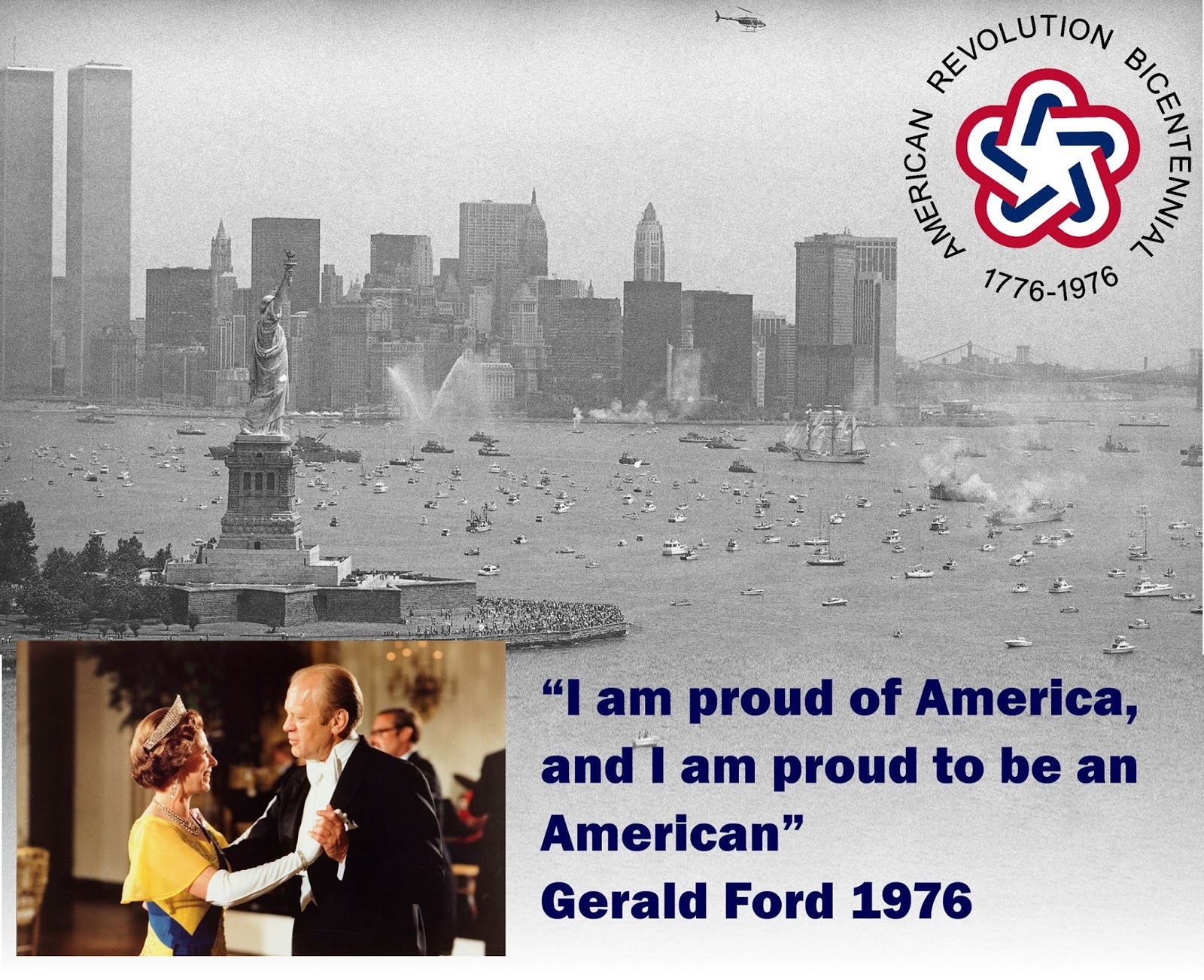
JIMMY CARTER
AND THE NATIONAL ELECTIONS OF 1976 |
|
1976 was also an election year for the White
House. The Republicans had swung their support behind Ford and
nominated him as their candidate for the presidency. But the Democrats
had no strong front-runners among the pack of people that could have
been considered potential candidates for the presidential nomination.
Ted Kennedy would have been the logical choice, given the Democratic
Party's love of the name Kennedy. But Ted had the albatross of
"Chappaquiddick" hanging around his neck and he knew that to run he
would have to face that issue again. None of the Democrats wanted that
tragic (and embarrassing) event brought back up for closer inspection.
The Democrats ultimately chose a
virtually unknown one-term governor (1971-1975) from Georgia as their
presidential nominee. The press was totally fascinated with this
seemingly humble peanut farmer (but also ex-Navy man) from Georgia, and
in short order (from late January to mid-March of 1976) from a virtual
nobody he was refashioned into the image of an amazing political genius
by the press. Since so little was known about him, he had only a local
political record to draw from, there was no way to fault this image. In
the space of that small time-period Carter pulled smartly ahead of all
other contenders, and ultimately received the Democratic Party
nomination.1
1It
could also be that it served Ted Kennedy's political ambitions to have
someone in the White House who had no political foundations of his own
to stand on – leaving the way clear for Kennedy to continue to direct
American democracy from his seat in the Senate.
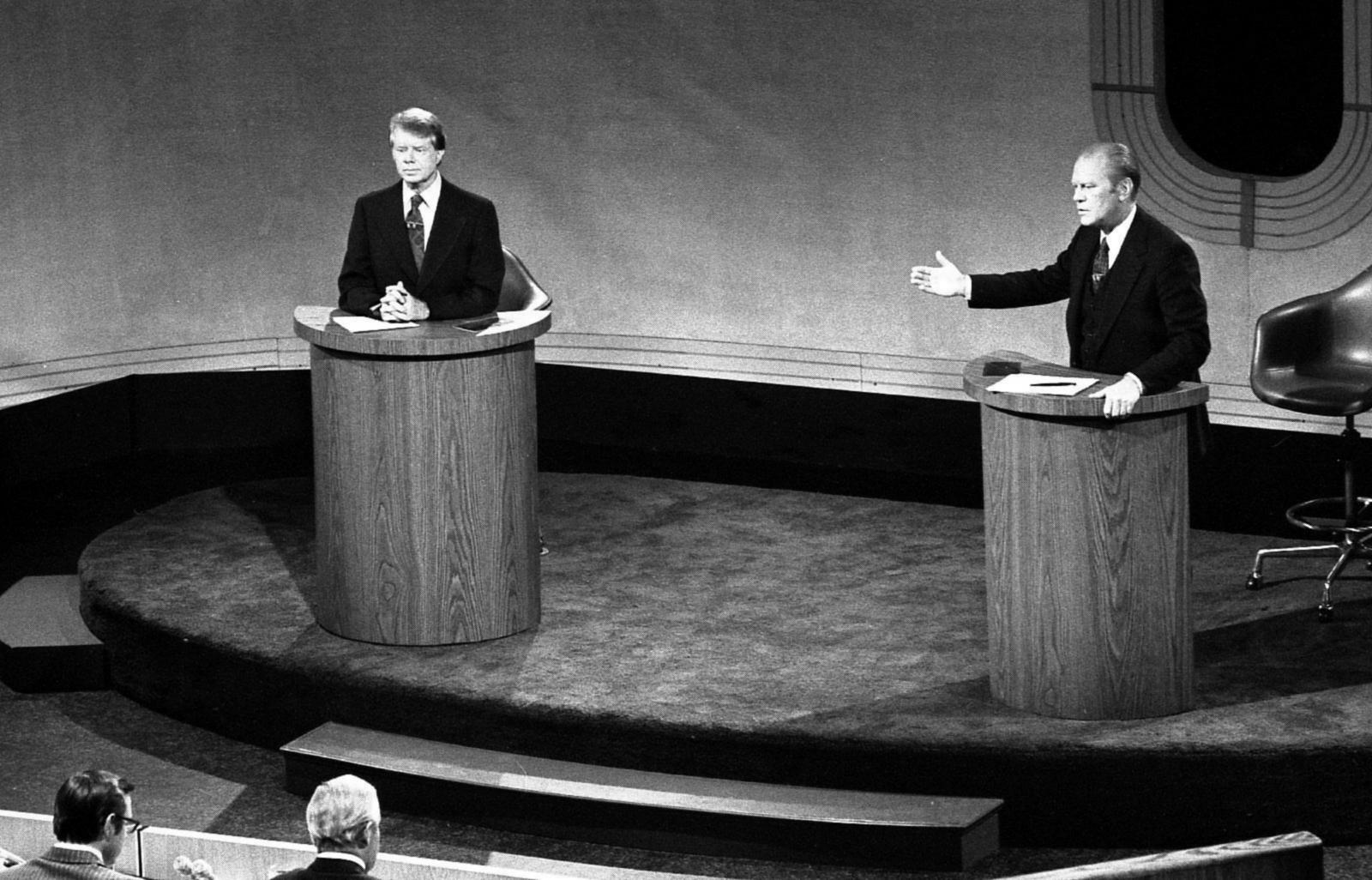
Governor Jimmy Carter
and President Gerald Ford debating
at the Walnut Street Theater in Philadelphia – September 23, 1976
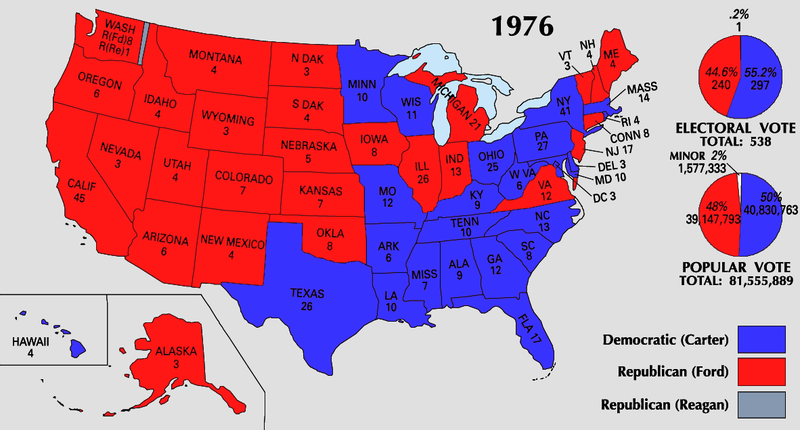
The 1976 Presidential Elections
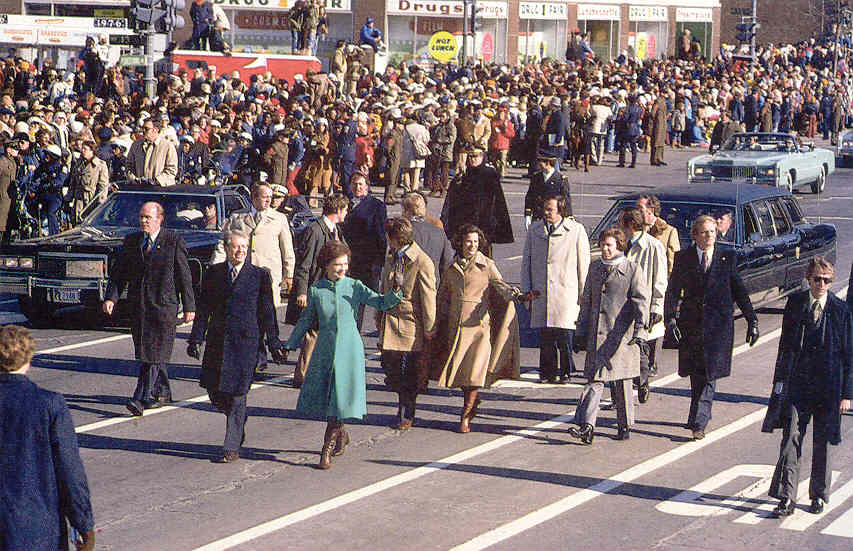
Carter setting the stage
for his more "down-home" administration
by walking to his inauguration
ceremonies – 1977
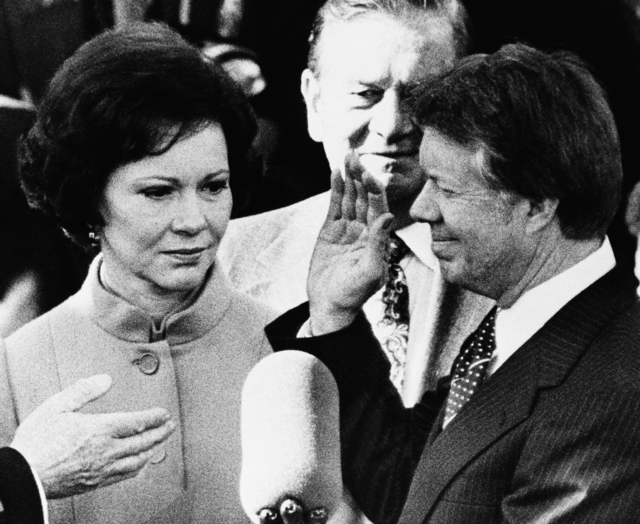 Carter taking the oath of office Carter taking the oath of office
 Jimmy Carter – President
1977-1981
Jimmy Carter – President
1977-1981
CARTER PROPOSES A FOREIGN POLICY OF "MORALITY" |
In his public debates as the Democratic
nominee, Carter attacked the content and style of the foreign policy of
the Republicans, claiming that with its "secret diplomacy" (such as had
taken place in Nixon's early diplomatic initiatives with the Chinese
and the Russians) it excluded the American people and Congress from
their participation in the shaping of a more democratic American
foreign policy. He attacked America's support of foreign dictators, its
huge involvement in arms sales, and its ignoring of human rights
abroad. The Cold War was over (or so Carter claimed) and it was clear
that America had no further reason to follow the reactive diplomacy of
that era. Thus he made it particularly clear that he strongly opposed
the amoral philosophy of Realpolitik
practiced during the previous eight Republican White House years. He
lauded the high Idealism and moral character of America's traditional
or democratic foreign policy (such as Wilson's or Johnson's?) – and
repeatedly announced the idea that he was going to restore that
high-mindedness in American foreign policy. Among other new policies
that would happen under his presidency, America would no longer support
dictators simply because it was in some Realpolitik understanding of
the "national interest." In particular he put both Iran and South Korea
on notice that they must liberalize their governments, or lose American
support.
This seemed to impress the American voter
sufficiently so that Carter was able to defeat Ford (50.1 to 48.0
percent) and enter the White House in January of 1977, ready to send
America off in a new moral direction.
But very quickly Carter was shown the dangers
of cutting back on American troops in South Korea – as he had proposed
during the campaign (and even NATO troops in Europe as well). Both the
military and Congress were quick to point out the terrible dangers of
undercutting our South Korean ally. So Realpolitik won that issue.
However, he was able to demonstrate some
"moral" movement toward a better world in other foreign policy areas.
He was quick to amplify the opening to China started by Nixon and to
sign with the Soviets a second round of arms limitation treaties (also
started by Nixon) as part of his peace-through-morality crusade.
Likewise, he was able to host a bold effort at
getting a breakthrough in Israeli-Arab relations, bringing into play
the very political "linkage" (horse-trading) that Carter had once
condemned in Nixon's (and Kissinger's) Realpolitik – but which Carter
eventually began to find to be fully acceptable: full diplomatic
recognition of Israel by Egypt as payment for the return of Egyptian
lands seized in the 1973 Arab-Israeli war. So it was that finally
Realpolitik helped Carter win on that issue as well. Nonetheless, all
of these were indeed authentic Carter achievements.
|
THE SURRENDER OF THE PANAMA CANAL |
|
But an early action of Carter's (September 1977)
would defy all explanations: Idealist or Realist. Carter decided to
"give back" the Panama Canal to Panama – a country which for $40
million in 1903 had turned control of the canal zone over to America so
that America could, at its own expense, build a canal there. Title to
such a valuable piece of property was extended to America in perpetuity
– but with the promise of an annual payment to the new Panamanian
government that Teddy Roosevelt had just helped set up three days
before the canal deal!
Now here was Carter turning the canal
over (by various stages of surrender, to be completed on the last day
of 1999) to a Panamanian military dictator, General Omar Torrijos – who
held power in Panama by military force since his takeover in 1968.
Where were Carter's scruples about not dealing with dictators? And what
was it that he was hoping to gain by giving up a vital American asset
that had taken ten years, millions (now equivalent to billions) of
dollars and thousands of lives to build?
If he thought he was gaining goodwill
among his Latin neighbors to the South, certainly they were glad to see
America retreating from its position of dominance in the area.
But this did not increase their respect, nor even their love, for
America. Why did Carter do it? Certainly also, the Panamanians
themselves wanted to own such a valuable asset – and had long desired
this. And why not? But why now? What was Carter hoping to
gain from this?
Anyway, Americans did not know how to
react to all this. None of Carter's "achievements" seemed at the time
to be of terribly earth-shaking importance or of any notable national
gain to a bleary-eyed America that found greater satisfaction in
watching a U.S. hockey win over the Russians in the February 1980
Winter Olympics held at Lake Placid (New York) in February, or a sense
of moral or spiritual strengthening in watching the movie Rocky (1976) and a Rocky II sequel (1979).
There was not much else to go on that
allowed Americans to feel any pride in their country. In fact, in the
last years of Carter's one and only term in office, America found
itself spiritually in terrible, terrible shape.
|
As a first act to reduce
the image of American "imperialism" Carter decides to
surrender the Panama Canal to Panama
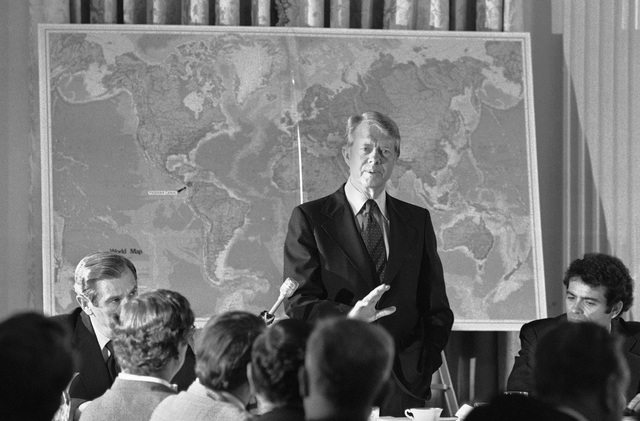 Carter explaining to
representatives of Georgia and Florida his proposed new treaty
to turn the Panama
Canal over to Panama – August 1977 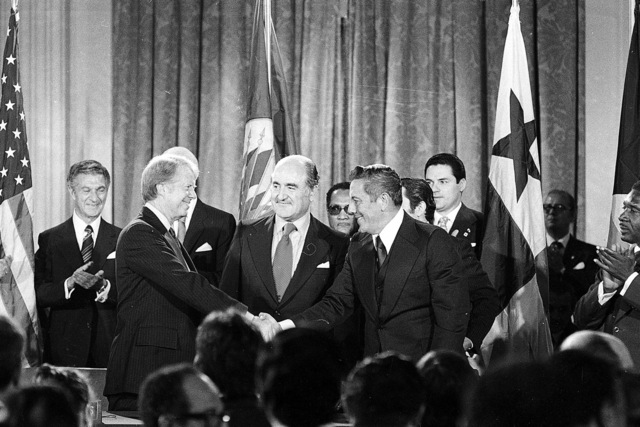
September 1977 – Jimmy Carter
agreeing with Panama's President Omar Torrijos to surrender the Panama Canal over to
Panama –
a sign of our ending the era of American imperialism
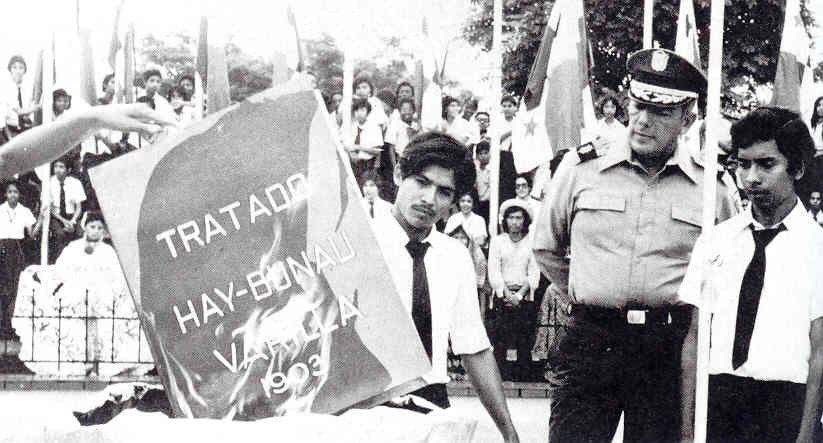
Symbolic burning of the 1903
Panama treaty – with Panamanian President Omar Torrijos looking
on
THE FALL OF THE SHAH OF IRAN |
|
Carter: From Idealism to Realism in Iran
Carter's policy toward a key ally in the Middle East, Iran, turned out
to be much more complex – and ultimately a terrible failure. Part of
the problem was that Carter failed to follow a consistent policy on
Iran.
At first Carter took a strong stance with
respect to his warning to Iran's Shah (King) Mohammed Reza Pahlavi that
the Shah was going to have to make some serious moves to improve human
rights in his country if he were to continue to receive American
support. The organization Amnesty International reported that there
were some 3,000 people imprisoned in Iran simply for their political
views. Carter wanted that situation improved, and demanded of the Shah
an opening up of Iran to greater democratic participation or America
was no longer going to continue to supply Iran armaments as it had been
doing (one of the things Carter had attacked Ford for supporting).
Carter had in mind improving the lot of Westernized intellectuals (of
which there were many in Iran) who were clamoring for greater political
freedoms.
But Carter soon came to understand (once again) the situation in Realpolitik
terms. Iran was holding in place a very strong pro-American status quo
in the oil-rich and highly dangerous Persian Gulf region. The Soviets
had long put pressure on Iran in the hopes of bringing the country
under its satellite system, which if successful would have allowed
Russia not only direct access to the strategically important Persian
Gulf and the Indian ocean, but would have also put Russia in a position
to shut down the flow of oil to its rivals in the West. Indeed, such
Soviet pressure was already being applied through the opposition of a
number of Iranian intellectuals demanding an end to the Shah's
government. These the Shah had put in prison for wanting to overthrow
his government and replace it with a "democratic republic," much like
what had happened in neighboring Afghanistan.
Sadly however, the Shah had not made any
kind of distinction between those who wanted to overthrow his
government and those who simply wanted to reform it. In any case,
Carter now began to appreciate the pressure that the Shah was under. He
also came to understand that a similar overthrow of the Afghan Shah and
its eventual replacement by a "democratic republic" in Afghanistan had
turned out to be no more than a move of the Russians to set up another
Soviet puppet regime. And because of this Communist takeover in
Afghanistan, the Soviet Russians had advanced ever closer to the dream
of dominating south central Asia, the Persian Gulf and the Indian
Ocean. Carter finally understood the dangers to America and the West of
a failure to support the Shah.
The Shah moves back and forth
Now that Carter was beginning to see the
Iran situation and the Shah from a new perspective, he began to drop
considerably his talk of human rights reforms. Indeed, Carter made
sure, in a huge trip to various European countries (and India) at the
end of 1977, to also include Iran in the event, celebrating New Year's
Eve in Tehran with the Shah, even publicly praising the Shah's Iran as
"an island of stability in one of the more troubled areas of the world."
But by this time the Shah had already
made many concessions to his political opponents, fearing the loss of
American support. Nonetheless, now that Carter was singing a new
pro-Shah tune, the Shah interpreted this as permission to tighten back
up on the Iranian situation. But in the meantime, the brief window of
opportunity for rising expectations to develop that he had given his
opponents helped embolden and organize their opposition.
And when he then backtracked on their liberties, his opponents exploded
in violent protest. Things in Iran began to unstick, though Carter had
such poor intelligence informing him of the internal situation in Iran
that he was unaware of the extent of the Shah's mounting problems.
Could the Shah's government have been
saved at this point? Probably not. Anyway, the problem had been
building for a while. The 1973-1974 quadrupling of oil prices had made
Iran a very rich country. But sudden wealth can be terribly
destabilizing to any political status quo. Saudi Arabia's royal family
(a strong American ally that Carter had also once criticized as being
dictatorial) had seen to it that all Saudis got a good share of the oil
wealth that turned this Arabian desert kingdom into one of the
wealthiest countries (per capita) in the world. But the Shah had not
bothered to do that, merely letting the few families that controlled
the Iranian oil industry take much of that vast new wealth. That was
truly a huge social blunder. Also, heavy financial inflation had hit
Iran no less than elsewhere in the world – hurting deeply multitudes of
Iranians.
Iran's huge farming population lived off
the profits of the farming industry, not the oil industry. The price of
fertilizer and the fuel prices for their trucks and machinery had risen
with the price of oil. But the price for their farm products, pegged to
the world market's food pricing (determined largely by the massive
share of American food products on the world market), had not increased
any at all. Thus Iran's farming population had actually become much
poorer since the onset of the oil bonanza. The farmers who had once
adored their modernizing Shah now felt him to be indifferent to their
plight, and concerned only with the showy wealth of his family and
close friends. They began to see an evil conspiracy in the whole setup.
Likewise, the voices of the farmers were
joined by multitudes of bitter young Iranians from Iran's rising Middle
Class, graduates from engineering colleges in the West (America,
Germany, England, France, etc.), unable to find work back in Iran.
Sadly, the oil extraction business did not really require the
professional services of many engineers. Thus when these young Iranians
returned home and were greeted with the sad news that there were no
jobs in Iran needing their advanced schooling, they too saw some kind
of evil conspiracy as responsible for their plight.
During the days of economic growth and
expansion that touched most every Iranian in the 1960s the Shah was
actually a very popular figure in Iran. The fact that he was
modernizing or Westernizing Iran seemed to be a very good thing to all,
except the Muslim clergy and some of the bazaaris (bazaar shopkeepers)
who resented this Western intrusion into their traditional Muslim
culture. But mostly the latter were ignored as being voices of
"backwardness," and irrelevant to Iran's future.
But that assessment of
the Muslim clergy and conservative Muslim faithful would change
considerably in the 1970s. The idea of an "evil conspiracy" fit well
with the Shi'ite Muslim worldview of the great dichotomy in life
between the forces of good and the forces of evil. The Muslim clerics,
led by their ayatollahs, and in particular the Ayatollah Ruhollah
Khomeini in exile in Iraq (and finally Paris), who was sending sermon
cassettes by the thousands back to a growing following in Iran, seemed
to more and more Iranians to make the most sense of an otherwise
desperately confusing situation. God was punishing Iran for having
allowed itself to fall prey to the evil ways of the infidel West, and
in particular to the Great Satan, America
The fall of the Shah's pro-American government
But Carter did not see that last factor
brewing. America had left its intelligence gathering in Iran in the
hands of the Shah's secret police, who had learned long ago not to send
forward any information that might displease the Shah. Thus Carter was
completely blindsided by events brewing in Iran. By the end of the
summer in 1978 strikes were paralyzing Iran, and they only continued to
worsen as the year approached its end.
Finally in mid-January 1979 the Shah went
into exile – and at the beginning of February the Ayatollah Khomeini
returned from Paris to Iran. By mid-February the last of the pro-Shah
forces had been crushed.
Then almost immediately a deep break in
the anti-Shah ranks revealed itself as Khomeini began to move to
undercut a secular "provisional" government, a government supported by
the huge, fully modernized (and rather pro-West) portion of the
population, that had initially taken charge of the country. Immediately
the Muslim crackdown on the voices of liberal dissent got underway.
Iran was not going to become a communist
democracy or even a liberal democracy. It was going to become a
fiercely traditionalist Islamic Republic, a fully Shi'ite society with
an elected government, but one which was ultimately answerable to the
all-powerful religious leaders, the ayatollahs, and in particular to
the Supreme Ruler, the Ayatollah Khomeini. Thus the new
governmental design was put before the Iranian people for
approval. And America, unwittingly (or by careful design by some
Iranians), would help swing Iranian approval for the new Islamic
Republic.
|
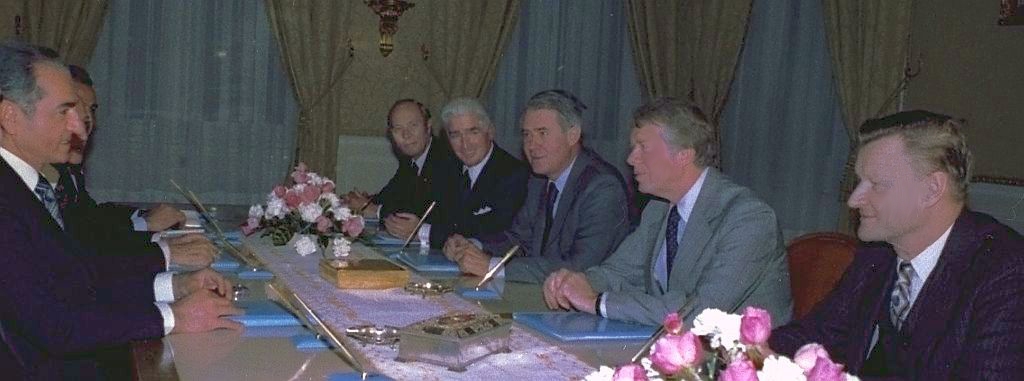
Carter and his cabinet meet
with the Shah of Iran – November 1977
(Carter, 2nd from the right ...
with his secretary of State Cyrus Vance to his right
and his National Security Advisor
Zbigniew Brzezinski to his left ...
discussing with the Shah the political
reforms the Shah must undertake
in order to continue to enjoy American
financial support)
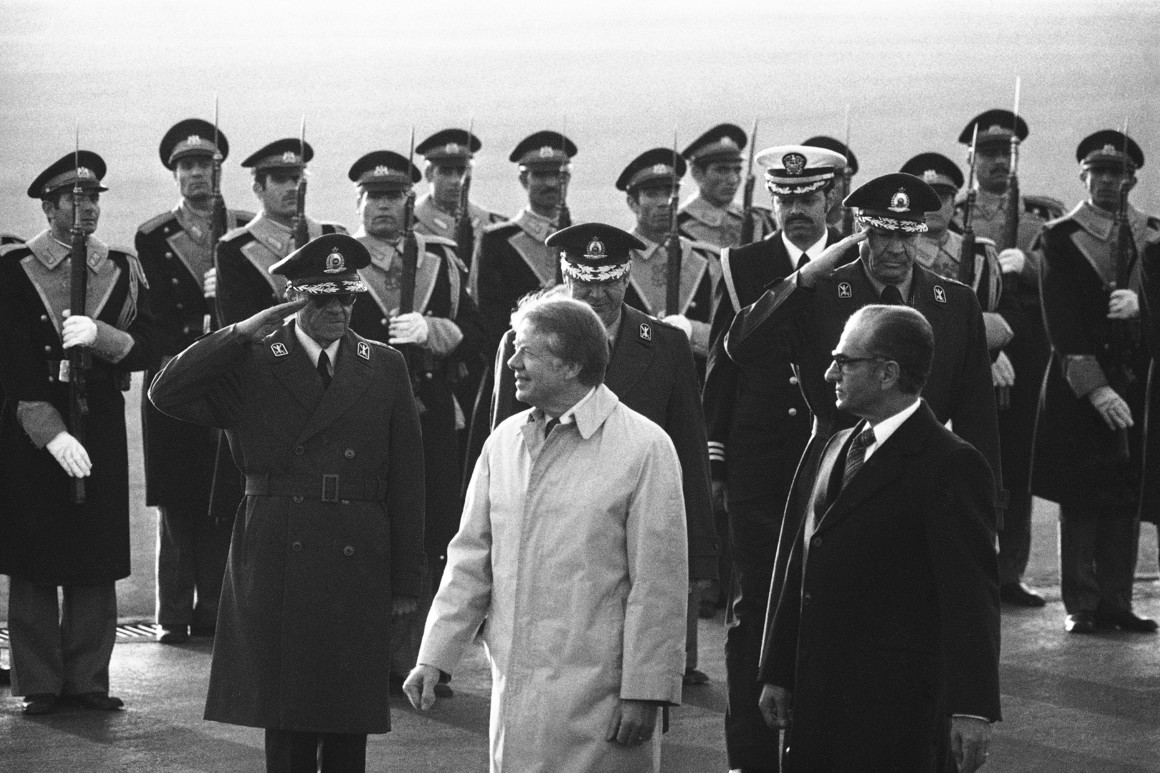
Carter arrives in Tehran in time to celebrate New Year's Eve with the Shah (December 31, 1977)
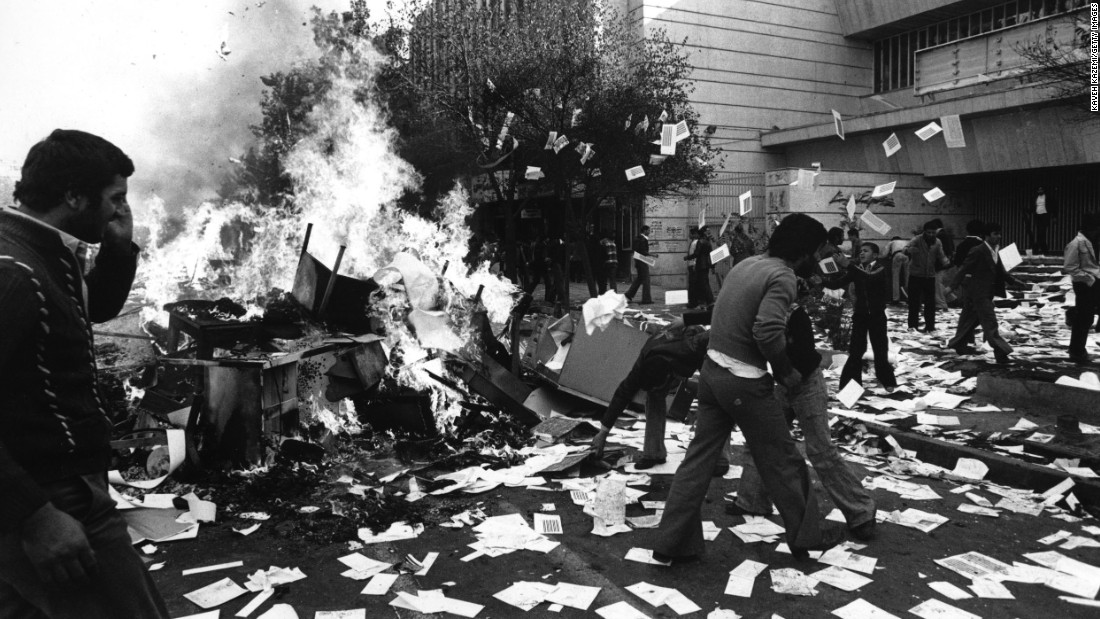
1978 – Iranian students protesting the
Shah's government
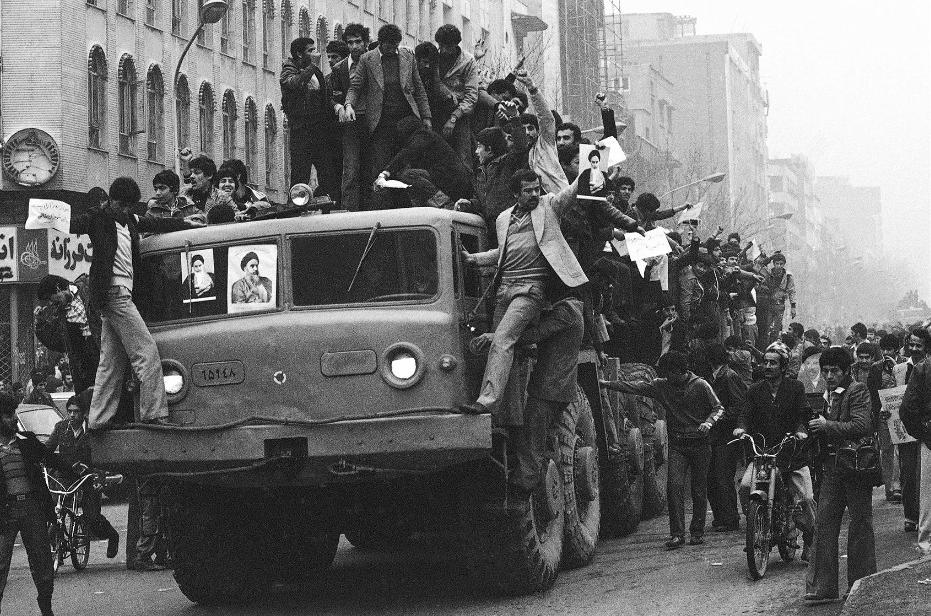 Iranians celebrating in Tehran on
January 17, 1979, after the Shah's departure 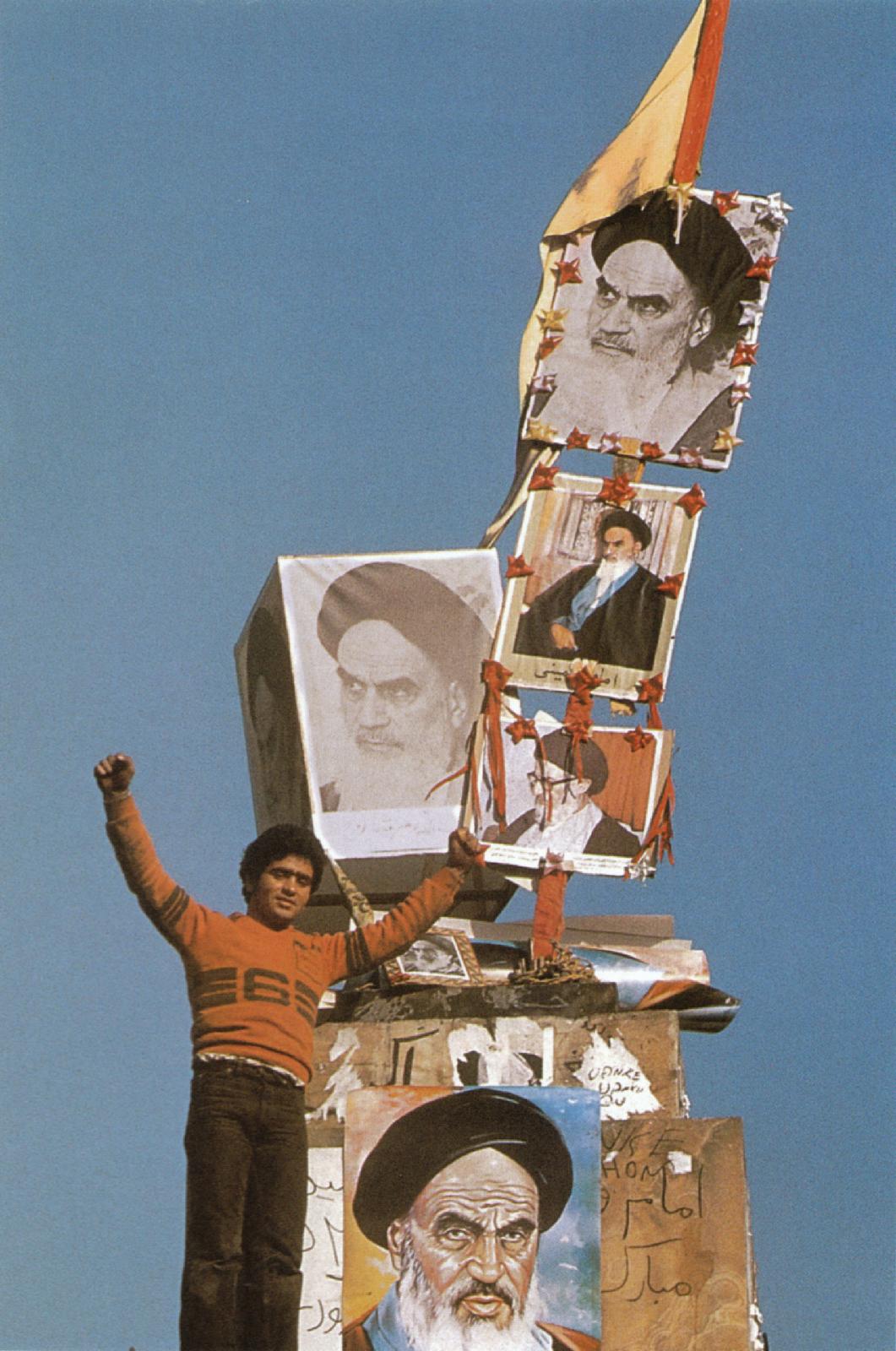
Iranian welcome the returning
Ayatollah Ruhollah Khomeini – January 1979 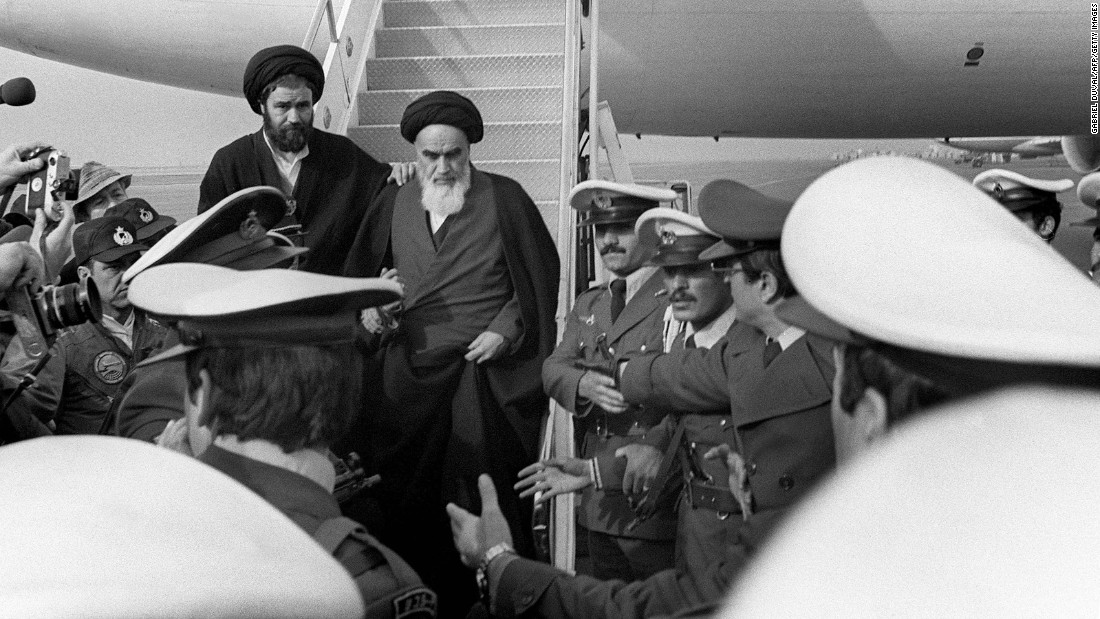
February 1, 1979 – the Ayatollah Khomeini arrives in
Iran
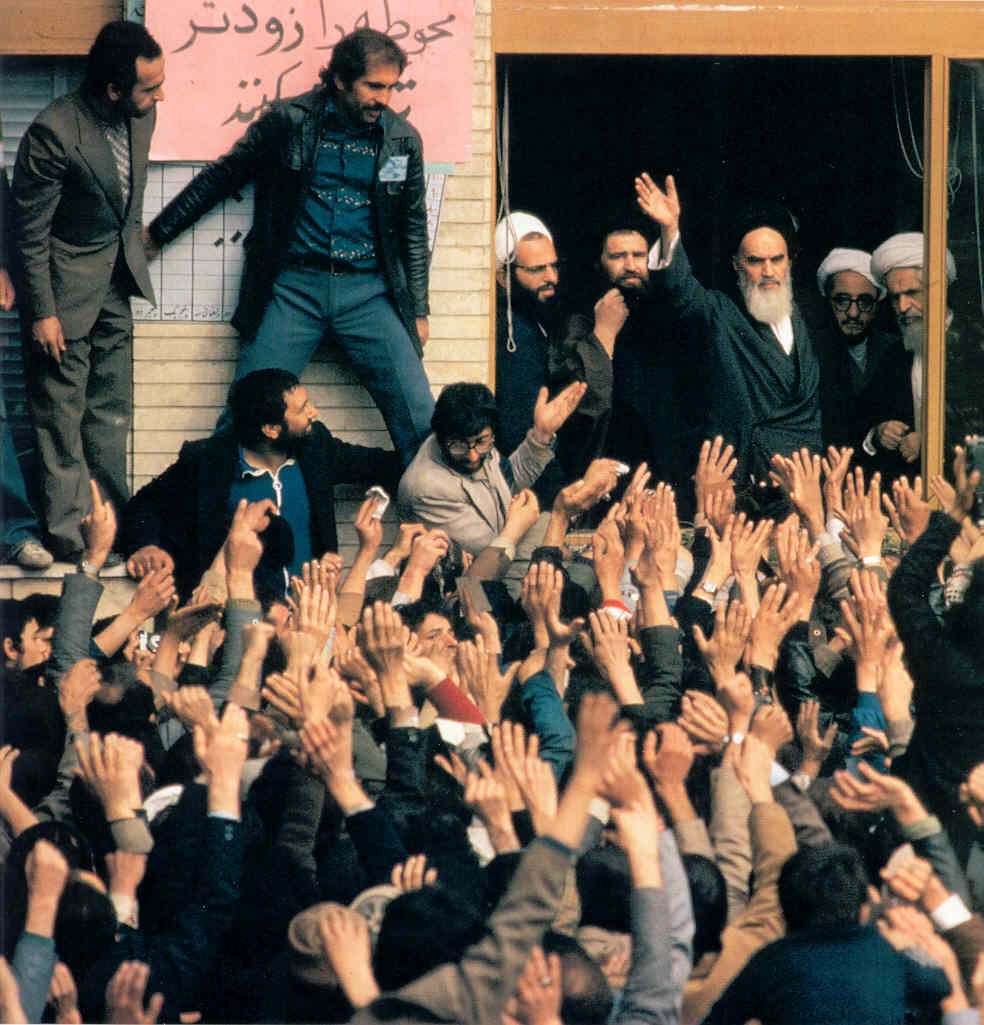
Followers of the Ayatollah
Khomeini celebrating his return to Iran from exile – Feb. 1979.
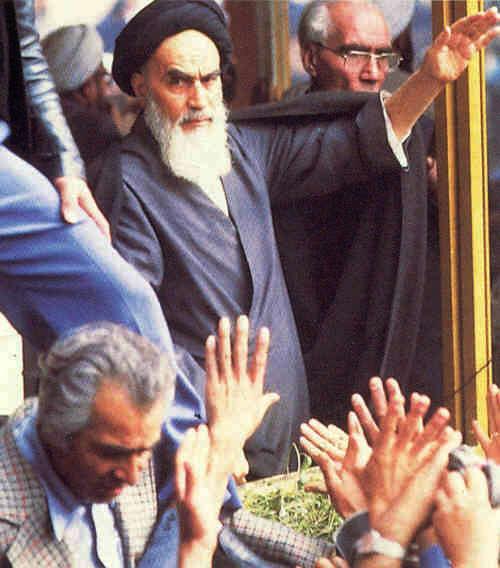
The Ayatollah Khomeini arriving
in Tehran – February 1979 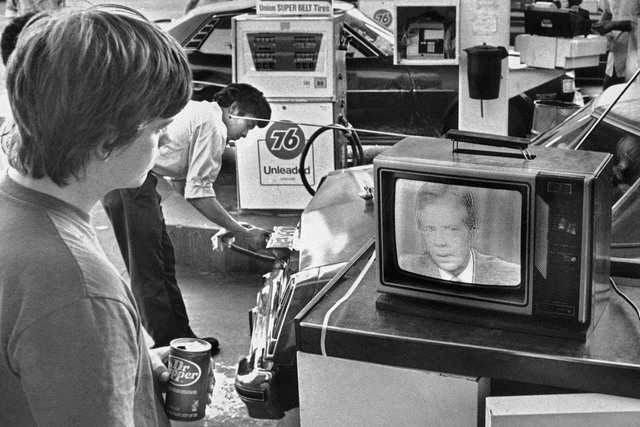 Gas station attendants watching
Carter's July 15, 1979 energy speech
CAMP DAVID, CHINA, SALT II, AFGHANISTAN,
AND IRAN (ROUND TWO) |
|
The Camp David Accords between Egypt and Israel (1978)
In September of 1978 Egyptian President Sadat and Israeli Prime Minister
Menachem Begin (yes, the one-time leader of the murderous Israeli
terror organization Irgun!) met with Carter for almost two weeks at the
Camp David presidential retreat, to work out some kind of diplomatic
agreement to bring the Arab-Israeli standoff to an end.
Despite various United Nations resolutions and back-and-forth
diplomatic discussions going on between Israel and its Arab neighbors,
nothing had changed in the status quo since the 1973 October War. Egypt
was having economic hard times and Sadat was determined to get some
movement on the return of the Sinai Peninsula to Egypt as some kind of
political offering to his people. He thus decided to break from the
Arab front and do his own separate negotiating with the Israelis
(secretly of course). At the same time, Israel found dealing with a
single Arab nation rather than the broad Arab front, and the
possibility even of breaking up that front, to be a distinct political
advantage, and consequently received probes about a new
Egyptian-Israeli rapprochement gladly. Thus in November of 1977 Sadat
totally surprised the world (including Carter, who had no advance
warning of this development) by flying to Jerusalem and delivering a
speech before the Israeli Knesset (Parliament), calling for new
Egyptian-Israeli relations.
Carter was at first reluctant to get involved in the Byzantine
complexities of Arab-Israeli relations, but finally was convinced of
the need to participate in, even sponsor, formal talks between Begin
and Sadat. Besides, Sadat had put himself in a very vulnerable position
within the Arab world, and some kind of payoff from this diplomatic
initiative needed to be soon forthcoming, or a rather pro-American
Sadat would find himself in deep trouble. Thus Carter called for the
gathering at Camp David.
But the biggest problem was what to do about the Jordanian West Bank
and Gaza Strip (Palestinian territory) issue. Sadat was interested
mostly in the status of Egypt's Sinai Peninsula (still under Israeli
occupation), which was not of critical interest to the Israelis and
thus easily negotiable. But the issue of Palestine (also still under
Israeli occupation) was very much of critical interest to Israel,
though not vital to the interests of Egypt. However, it was a matter of
critical interest to the broader Arab front, whose shadow constantly
hung over the efforts to work out a peace between Egypt and Israel. And
Carter was insistent that there be a Palestinian agreement accompanying
any Egyptian-Israeli agreement over the Sinai. Thus negotiations
dragged on at Camp David day after day.
But in the end neither Begin nor Sadat wanted to alienate Carter with
his strong American position on the matter, nor return empty-handed
from the talks. Consequently Begin agreed to respect U.N. Resolution
242 in all its parts, and pull back Israeli occupation troops from
both the Sinai and the West Bank and Gaza regions, and transfer authority over the
latter region to the Palestinians, over a five-year period (Syria had
not participated and thus the Golan Heights were not included in the
agreement).
Not everyone in the larger or international world was happy. Some were,
including Norway's Nobel Committee which awarded both Sadat and Begin
the 1978 Nobel Peace Prize for this diplomatic breakthrough. Israeli
settlers in the Sinai however were deeply angered by having to pull out
of homes they had built there. Likewise, stiff opposition to the
agreement came from the United Nations, because it did not include all
the territory, and because it had not included the other neighboring
Arab governments in the deal (which actually would have made any
agreement impossible, as had long been the case). In the end, Carter
chose simply to ignore the outcry.
But Sadat paid a big price for his action. Egypt was kicked out of the
Arab League, lost its position as something of the leader of the Arab
world (which then prompted Saddam Hussein of Iraq to aspire to the same
position), and in the end cost Sadat his life – when some of his own
disenchanted troops (members of Egyptian Islamic Jihad) were able to
assassinate Sadat in 1981 during a review of his troops. But
nonetheless, the agreement held, and General Mubarak, in replacing
Sadat, would continue to follow the lines of the original Sadat
agreement.
|
Carter also believed that moral persuasion
might also bring the Arab-Israeli crisis
to a peaceful resolution.
But Egyptian President Anwar al-Sadat beat him to the
punch by flying to Israel
to offer Egyptian terms of peace with Israel.
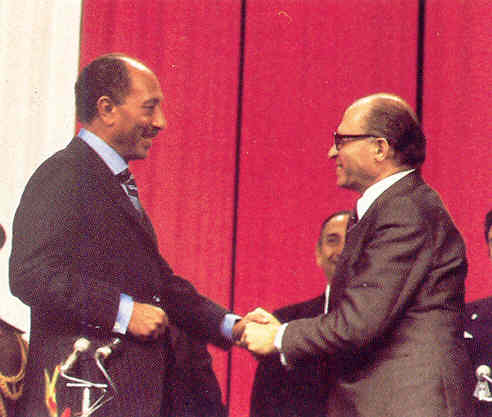
Israel's Prime Minister Menachem
Begin welcomes Egyptian President Anwar Sadat
to Jerusalem – November
1977
| Carter then moved to sponsor a
meeting at the President's Camp David retreat where he intended to see
some serious negotiations take place. Begin was dragging his feet on
some kind of compromise with Sadat ... putting Sadat in political trouble back in
Egypt the longer Begin held out. Carter would have to lean on Begin a bit to get him
to move forward.
|
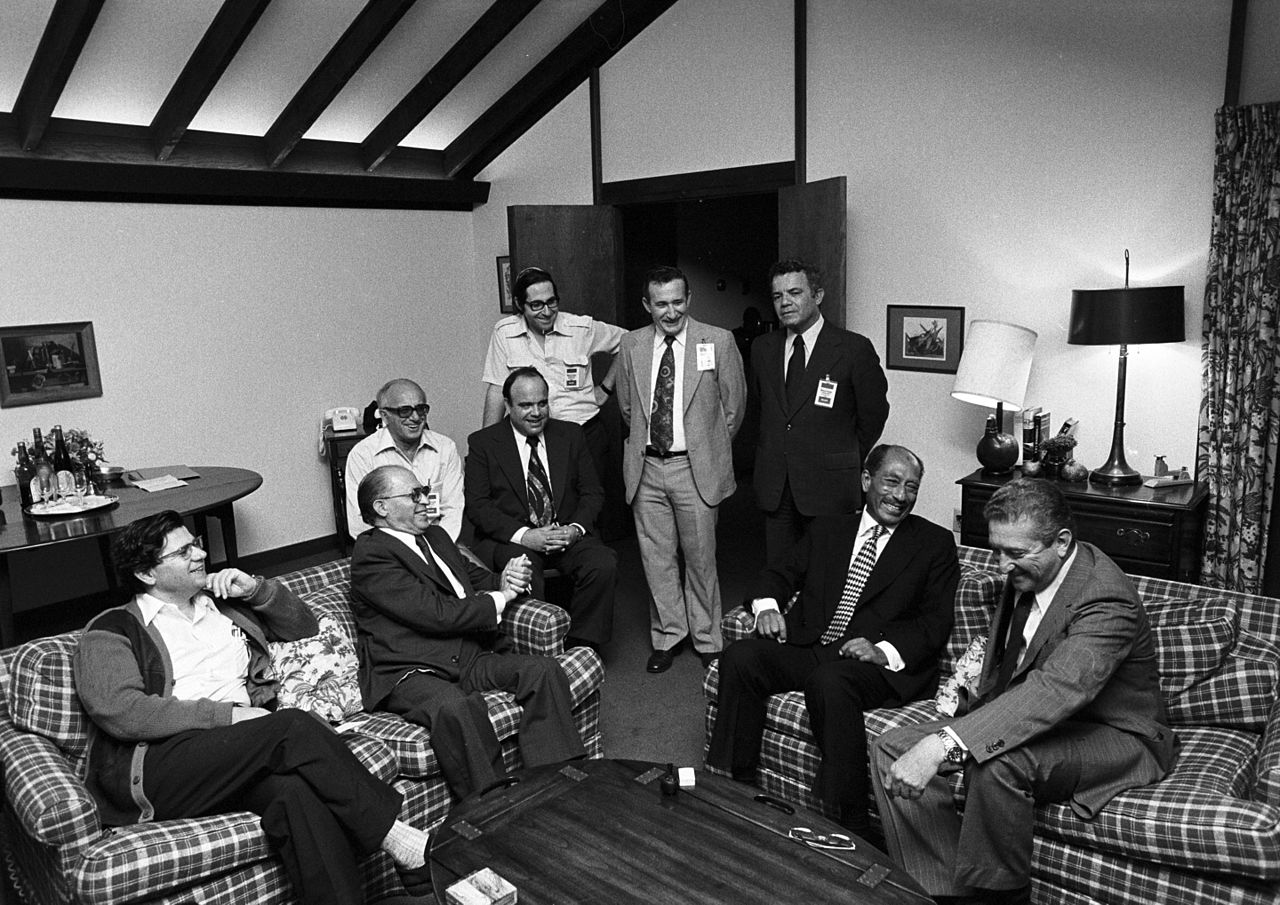
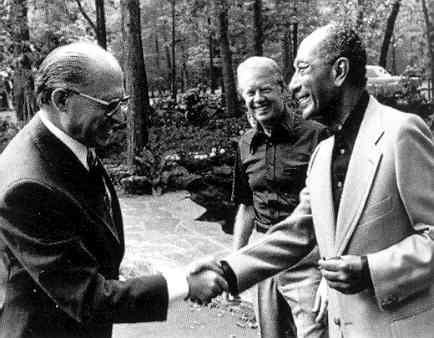
Begin, Carter and Sadat at
Camp David – September 1978
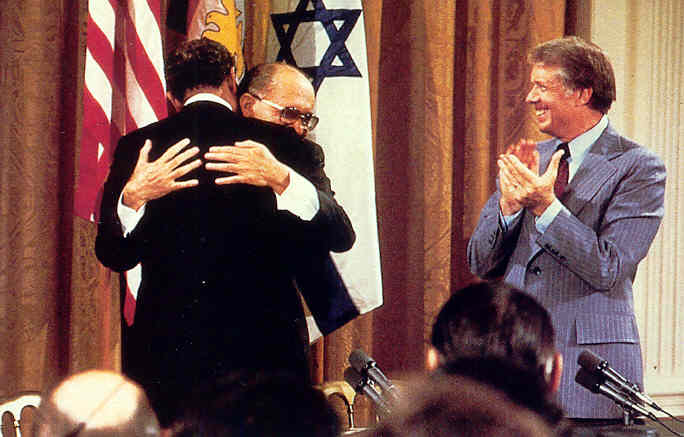
Anwar Sadat and Menachem
Begin embracing while Jimmy Carter looks on – September 1978
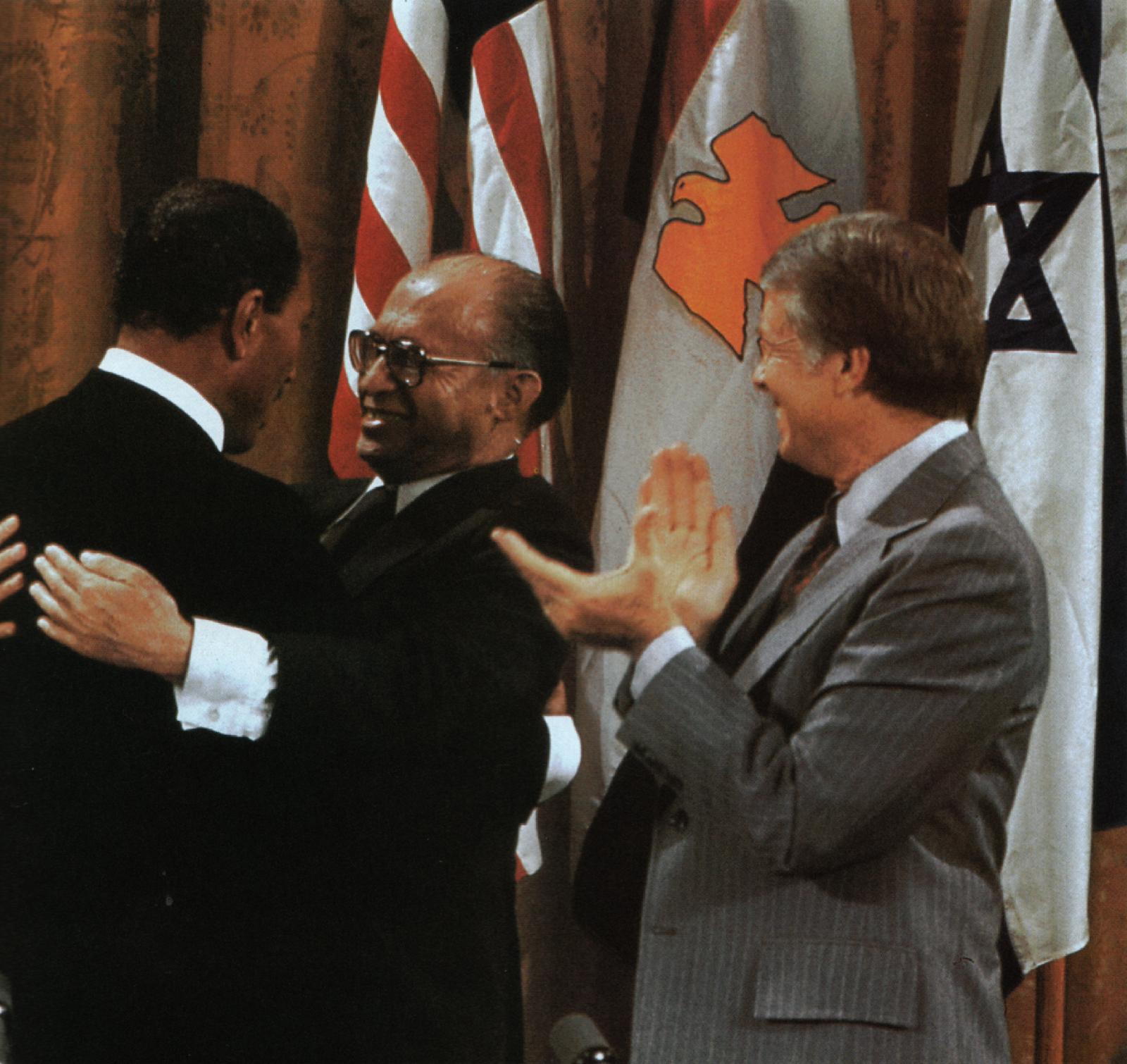
Anwar Sadat, Menachim Begin
and Jimmy Carter at the end of the Camp David talks – September 1978
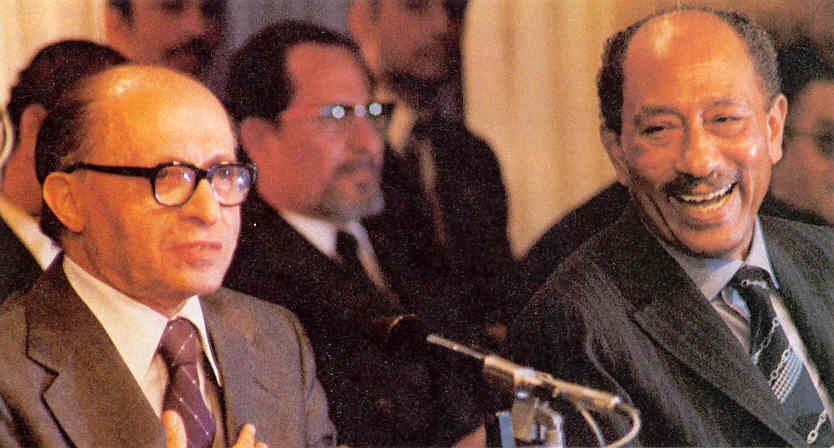 Menachem Begin and Anwar
Sadat
Menachem Begin and Anwar
Sadat
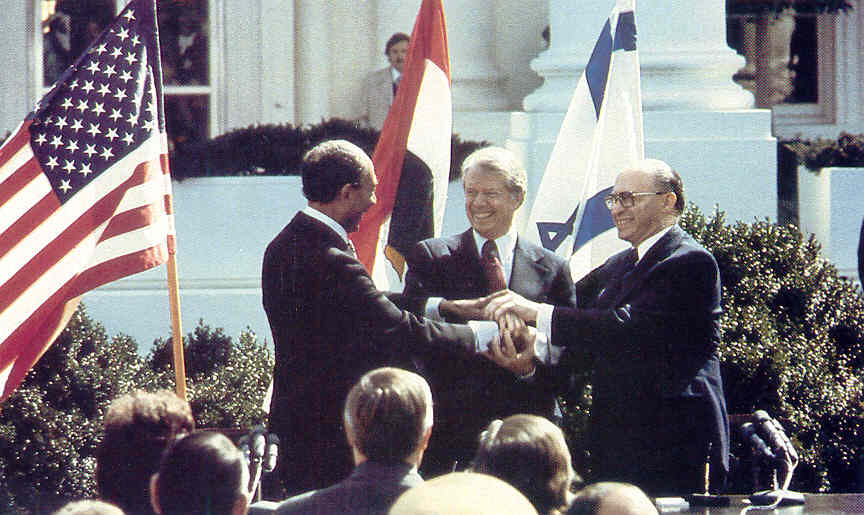
Egyptian President Anwar
Sadat, President Jimmy Carter and Israeli Prime Minister sign
Camp David
Accords in 1978
China
|
Ever since Nixon's visit to China in 1972 and the
establishing of the U.S. Liaison Office in Beijing in 1973, America had
attempted more or less normal relations with China. Then in 1977,
Carter saw the opportunity to further strengthen Chinese-American
relations (he now understood Realpolitik
quite well), sending his National Security Advisor Zbigniew Brzezinski
to China in August to start up a new round of diplomatic talks,
principally about the sticky problem of America's ongoing support of
Taiwan. Eventually U.S. negotiators accepted a full severance of
diplomatic ties with Taiwan, but under the promise of Beijing that
America would be allowed to continue freely its commercial relations
with Taiwan. This agreement thus led to Carter's invitation to Deng to
visit Washington in January of 1979 where together they could sign the
new diplomatic accords, preliminary to the formal recognition of China
later that year.
|
Carter also makes the decision to extend formal diplomatic recognition to the Communist
Government in Beijing ... confirming the fact (set in Nixon's presidency) that America
recognized Taiwan as actually part of China ... under the promise from Beijing
that America could continue to trade freely with Taiwan.
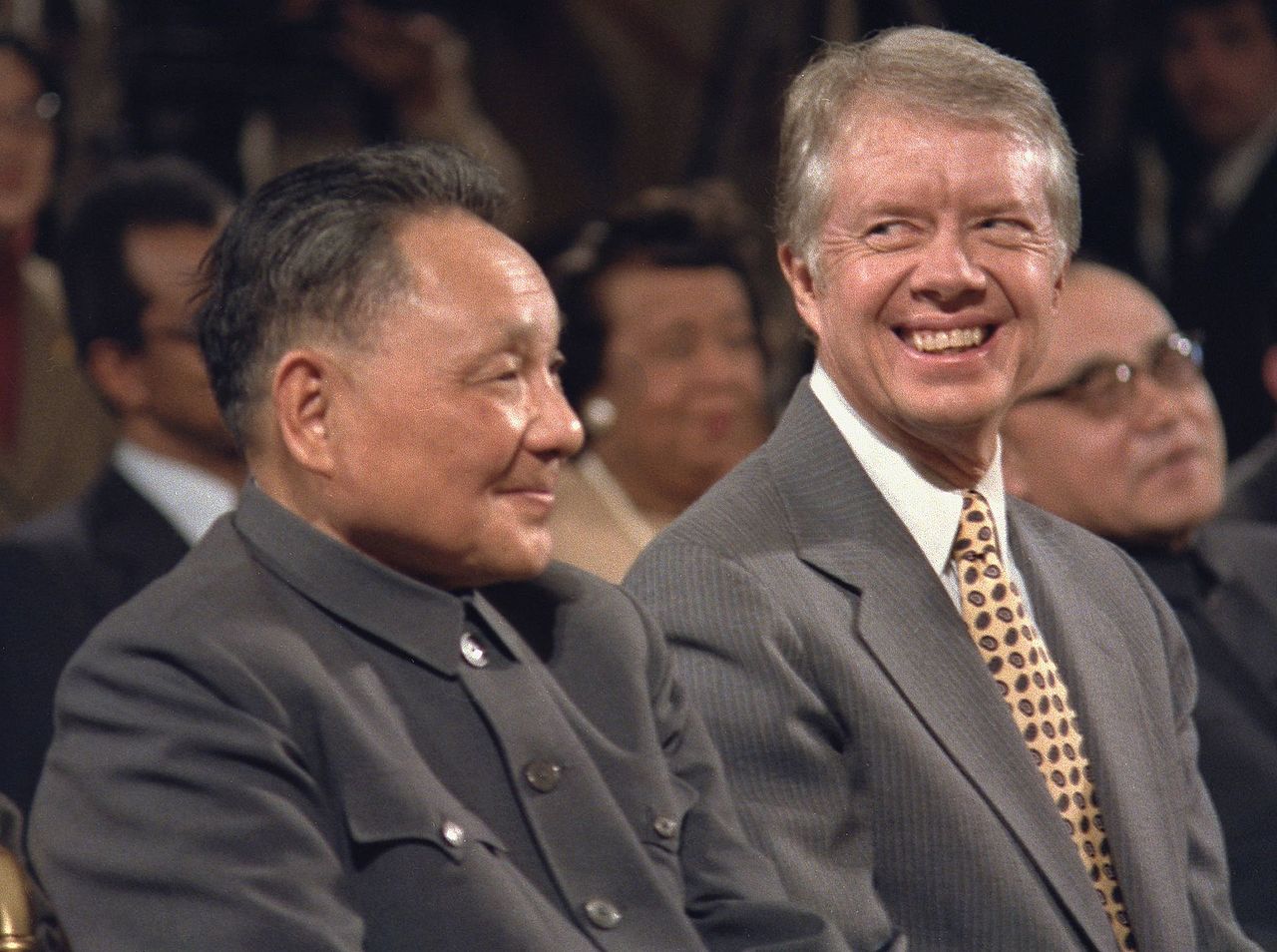 Carter receiving a visit in January of 1979 from Chinese leader Deng Xiaoping 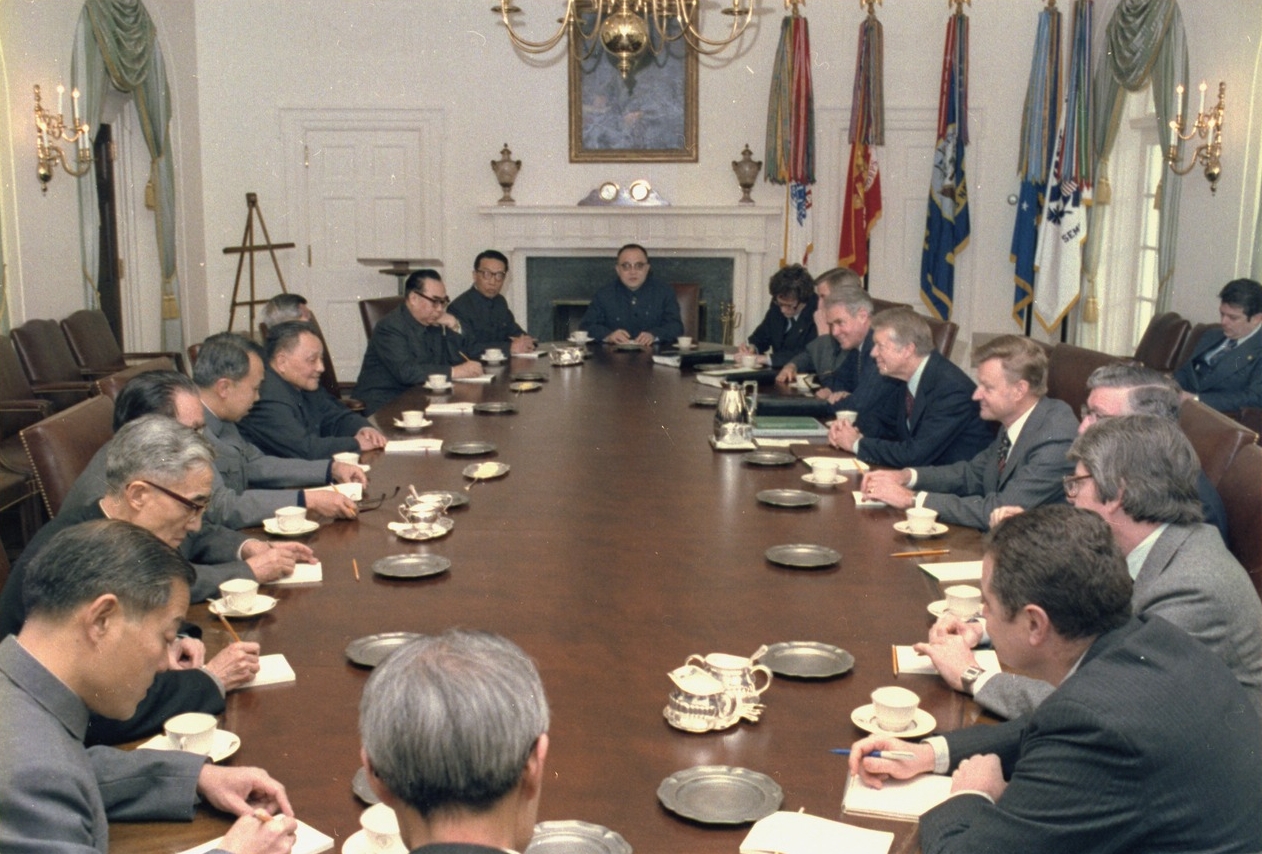
A meeting in the White House of Carter and Deng Xiaoping and their diplomatic teams – January 1979
SALT II and the Soviets
Carter also wanted to follow-up on Nixon's
arms-limitation talks with the Soviets
|
Carter and Soviet Premier Brezhnev's SALT II Treaty (1979)
Then in June of 1979 Carter and Soviet Premier
Leonid Brezhnev met in Vienna to sign a SALT II Agreement, updating the
1972 Strategic Arms Limitation Treaty (SALT) signed years earlier by
Nixon and Brezhnev. Weapons technology and production levels had
advanced tremendously in the intervening seven years and thus the
purpose of the new agreement was to bring nuclear delivery devices
(notably the MIRV missiles capable of carrying multiple nuclear
warheads) under some kind of restriction or balance. But there were
also political motives behind the agreement, Russia becoming a bit
nervous over the serious improvement in Chinese-American relations
(China and Russia were more adversaries than Communist allies at that
point). And, with the Soviets seeming to be pushing ahead of America in
the arms race, Carter was concerned about one-sided self-limitation in
weapons development, a self-limitation on weapons development that he
himself had once supported strongly. Thus here too, Realpolitik was
now directing Carter in his conduct of American foreign policy.
Nonetheless, there was a huge reaction
(especially among Republicans) that the arms limitations levels agreed
on in Carter's new treaty merely placed limits on arms production if
one or the other of the parties was willing to make such limitations
(which Carter was, as part of his general philosophy), without any
clear enforcement provisions if one of the parties (namely the Soviets)
chose to push ahead in weapons development. But it ultimately came down
to the fact that America was going to have to decide whether to go
ahead and trust Carter on this matter of enforcement, or not.
Consequently, the debate on SALT-II in
the U.S. Senate dragged on endlessly, until December of 1979 when the
Soviets invaded Afghanistan. This abruptly killed the prospects for the
ratification of the treaty. The following month Carter simply withdrew
the treaty from further Senate consideration. SALT II was not
completely dead. But from this point on, only something of a diplomatic
"understanding" on this matter existed between America and the Soviets,
sometimes respected, sometimes not.
|
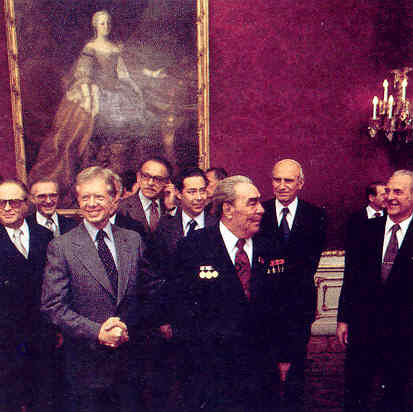 Carter and
Brezhnev
Carter and
Brezhnev
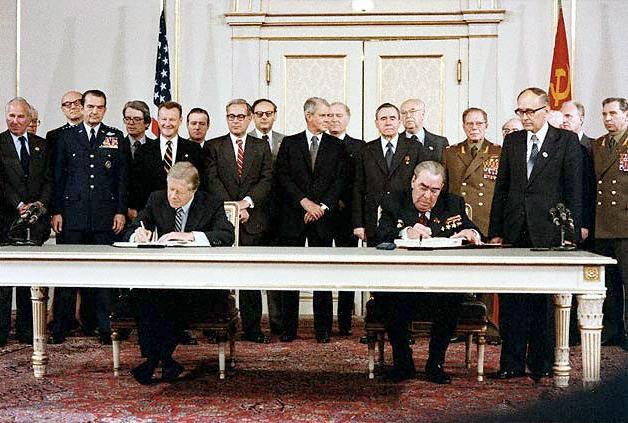
Carter and Brezhnev sign
SALT II in Vienna – June 1979
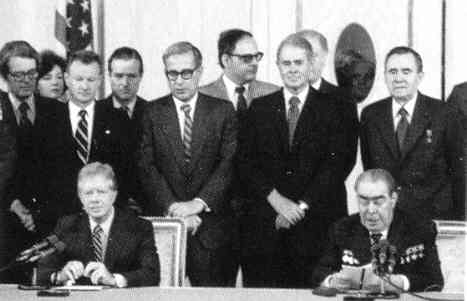
HOWEVER ... Carter withdrew the
treaty
from Senate confirmation in January 1980 after the USSR invaded
Afghanistan.
Afghanistan
|
The Soviets, in late December of 1979, had sent
their own special forces into Kabul, the capital of Afghanistan, taking
over the governmental offices and presidential palace. This was
accompanied by a larger and broader ground invasion of Soviet troops.
The Soviets were attempting to take over directly the governing of
Afghanistan.
The Afghan government had been in a state
of turmoil since 1973 when the Afghan King Zahir Shah's cousin,
Mohammed Daoud Khan, ousted the Shah and announced the creation of the
Afghan Republic, with himself as president. But Daoud's government was
much too secular for the tastes of the very conservative Afghan Muslim
society, and he failed to establish popular support for his government.
Also he tried to follow a neutral foreign policy in the Cold War,
succeeding only in alienating the Soviets who considered Afghanistan as
part of their sphere of influence. Two competing Afghan Communist
parties, with help from the Soviets, finally got their act together and
started putting pressure on Daoud, who reacted strongly.
In April of 1978 the Communists acted.
Daoud was assassinated and a Communist "Democratic Republic" under Nur
Mohammad Taraki was announced. Taraki began moving swiftly against his
opponents, especially the country's conservative leadership and
pro-Western intellectuals. Perhaps 27,000 of the country's leaders were
arrested and executed in Afghan prisons over the next year and a half.
By October of 1978 a full rebellion in
the Afghanistan countryside was underway, spreading quickly to the
outlying Afghan cities as well. Much of the Afghan army soon went over
to the rebels.
Taraki now called on the Soviet Union for
help (December). Then in mid-1979, Carter began to send secret aid to
the rebels (so much for "open diplomacy"!) The situation for the
Communist government only worsened through 1979 and thus it was that
another Communist leader, Hafizullah Amin, decided to try to save the
situation by getting rid of Taraki (murdered) and taking over the
government. But the Soviets immediately began to have suspicions about
Amin being a reliable ally. Also the United States basically appeared
to be merely lukewarm in its ultimate interest and minor in influence
in the region, and the Soviets thus supposed that they had no reason to
fear any kind of a serious reaction coming from America.
Thus it was that in December of 1979 they
made their move to take direct control of the country. Amin was
assassinated (KGB) and Babrak Karmal was now installed as the new
president, who in turn "invited" the full military assistance of the
Soviet Union.
The Soviet War in Afghanistan was on. But
the Soviets were about to find out what the Americans had discovered in
Vietnam, but apparently had not learned from the experience (nor had
the Soviets learned from their own experience in defeating Hitler's
invasion of Russia).2
Fighting local militia or guerrilla warriors with conventionally armed
troops is an unbalanced contest, favoring heavily the local forces. It
was going to take massive numbers of soldiers and supplies to bring the
Afghans under Soviet rule, something at that time that the Soviets were
increasingly less able to afford.
2Nor had America learned from its own War of Independence against the English King and his troops back in the late 1700s.
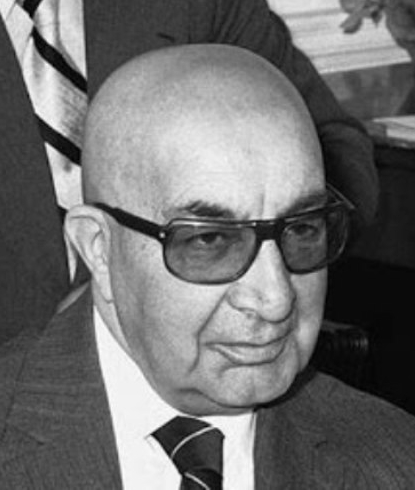
Mohammad Daoud Khan
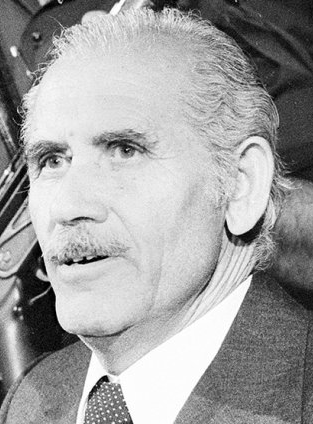
Nur Mohammad Taraki
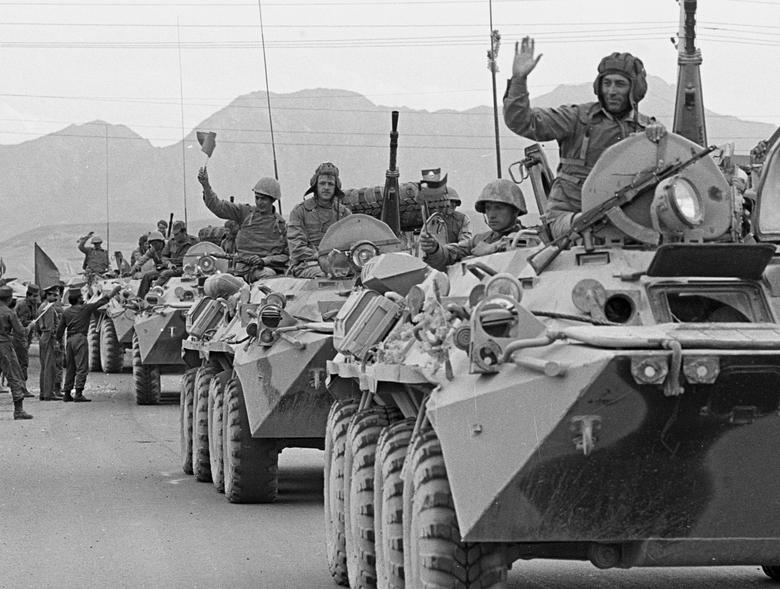
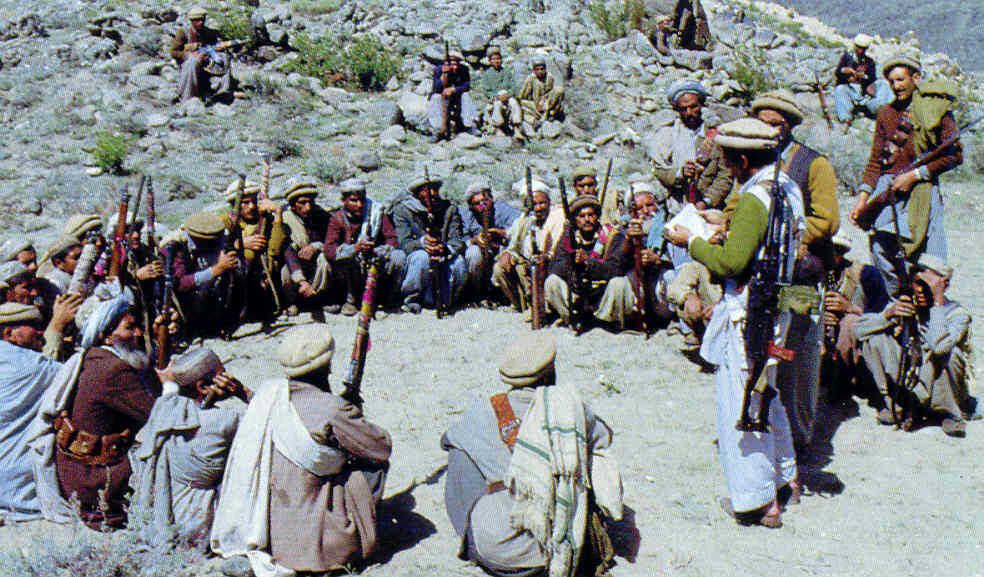
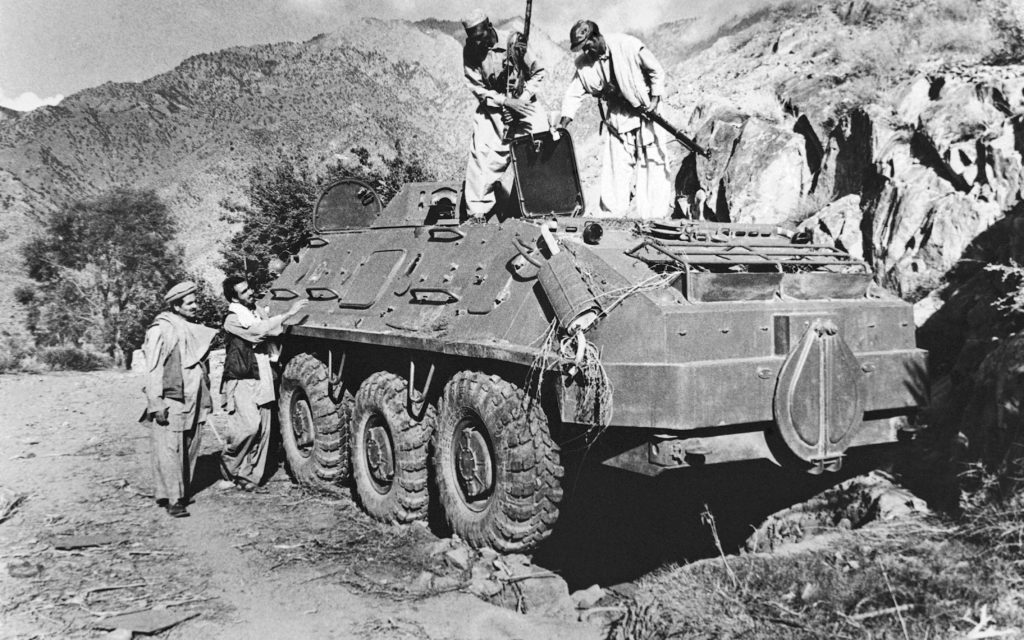
AMERICAN DIPLOMATS IMPRISONED IN IRAN |
|
America's further humiliation delivered by Iran
Meanwhile, in October of 1979, the ousted Shah,
who had developed cancer, was under consideration by Carter for
admission to the U.S. for treatment. On hearing this, Muslim students
in Iran went wild, and members of the militant Revolutionary Guard in
early November invaded the American embassy, seizing the staff and
displaying them to the world, tied and blindfolded as their sign of
contempt for the United States. The Iranians loved it, and a month
later, amidst a huge swell of Iranian patriotism, they easily passed
the referendum approving the establishment of their new Islamic
Republic.
For Carter this was the ultimate
humiliation. He was taking hits from the economy as well, because the
Iranian upheaval had severely cut back on Iran's oil production. And
oil prices, as well as inflation, climbed for the second time in the
decade of the 1970s. As a sign of how bad things were for Carter, Ted
Kennedy, who was now feeling more confident about a presidential run of
his own, was unabashedly loud in his attacks on Carter's presidential
performance.
|
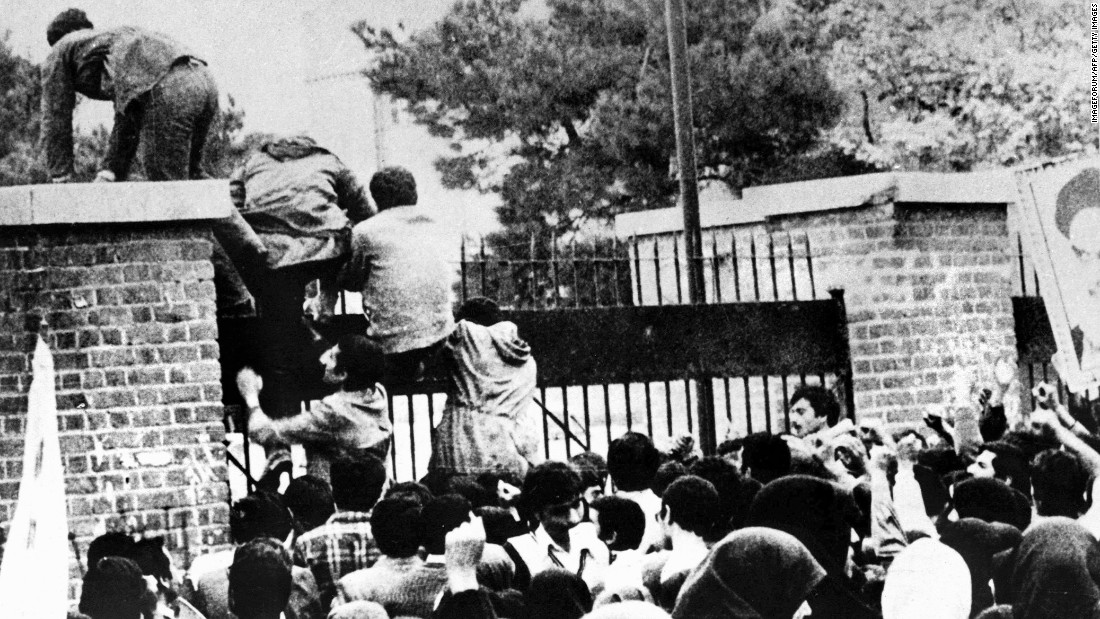
Iranian youth climbing over the wall
of the American Embassy – November 4, 1979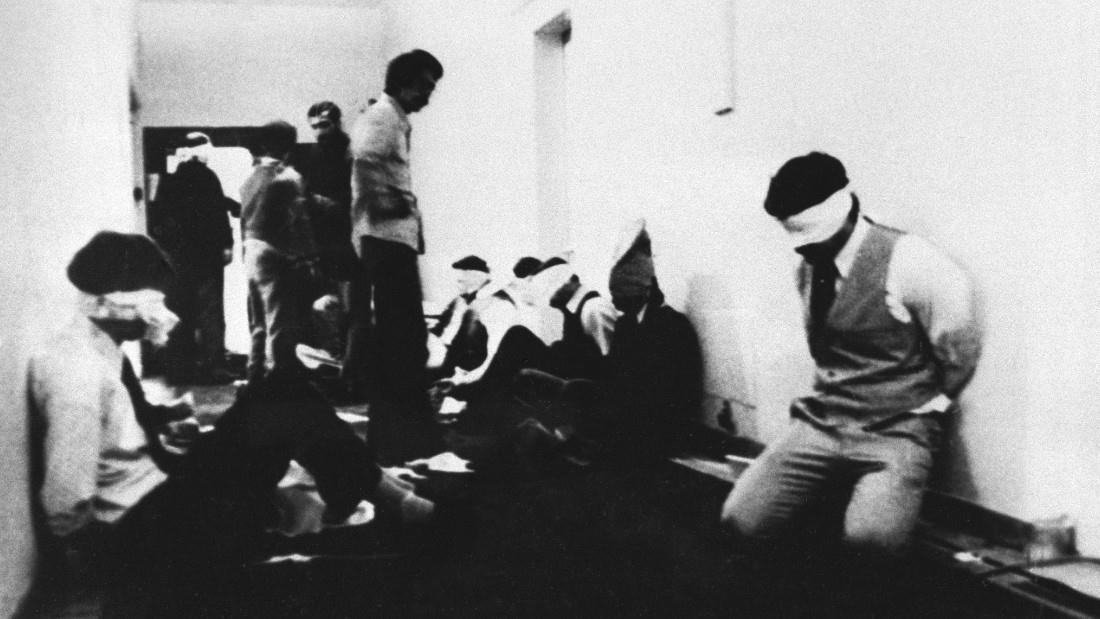
Some of the 90 hostages taken at the US
Embassy – November 4, 1979 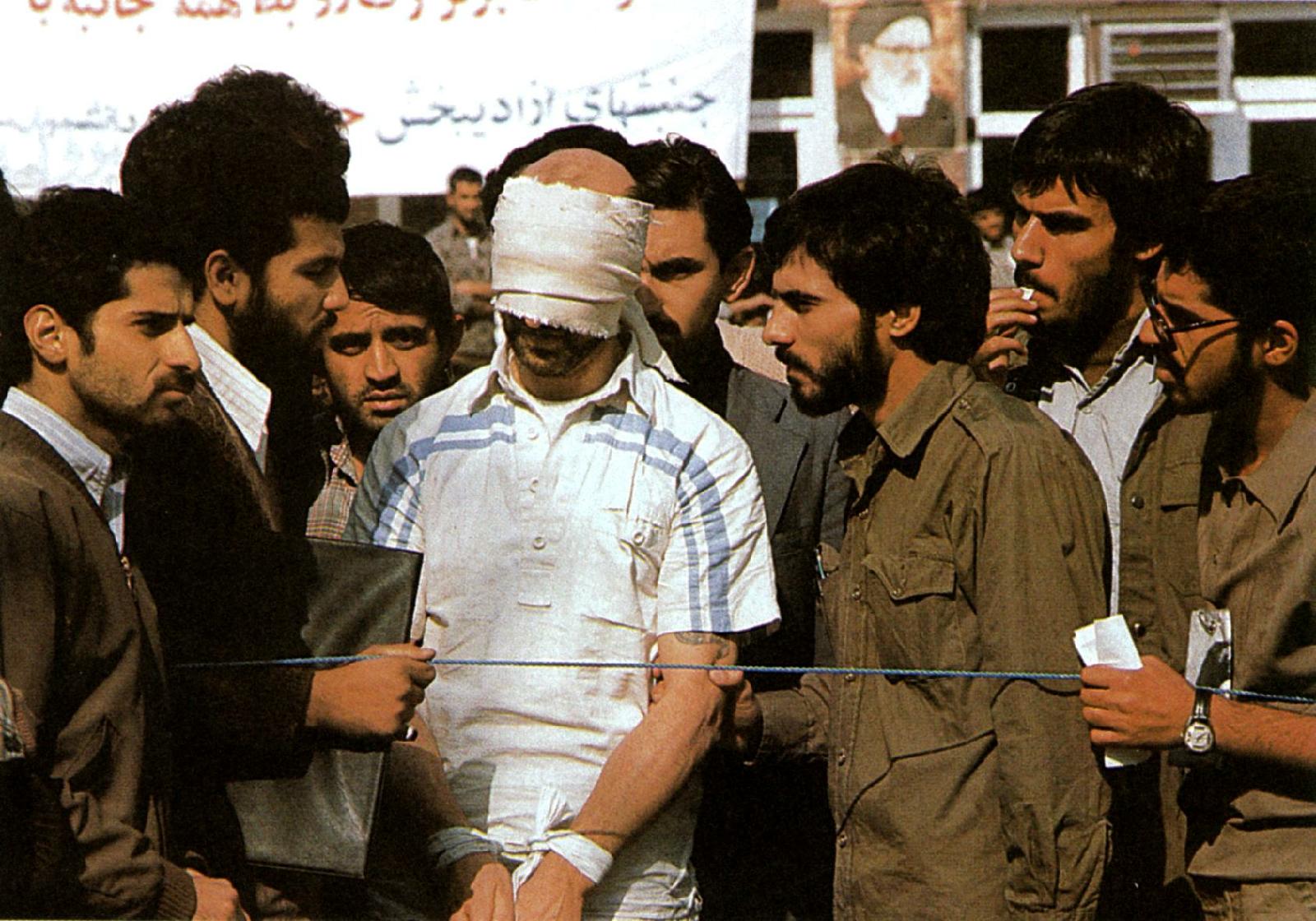
American embassy staff taken
hostage in Tehran by Muslim radicals – November 4, 1979
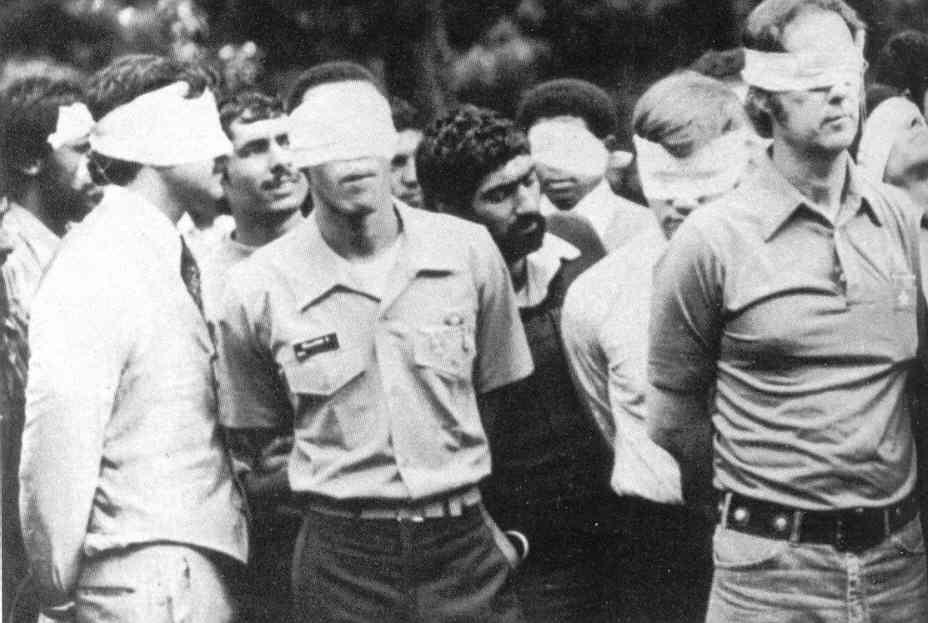
American embassy staff taken
hostage in Tehran by Muslim radicals – November 4, 1979 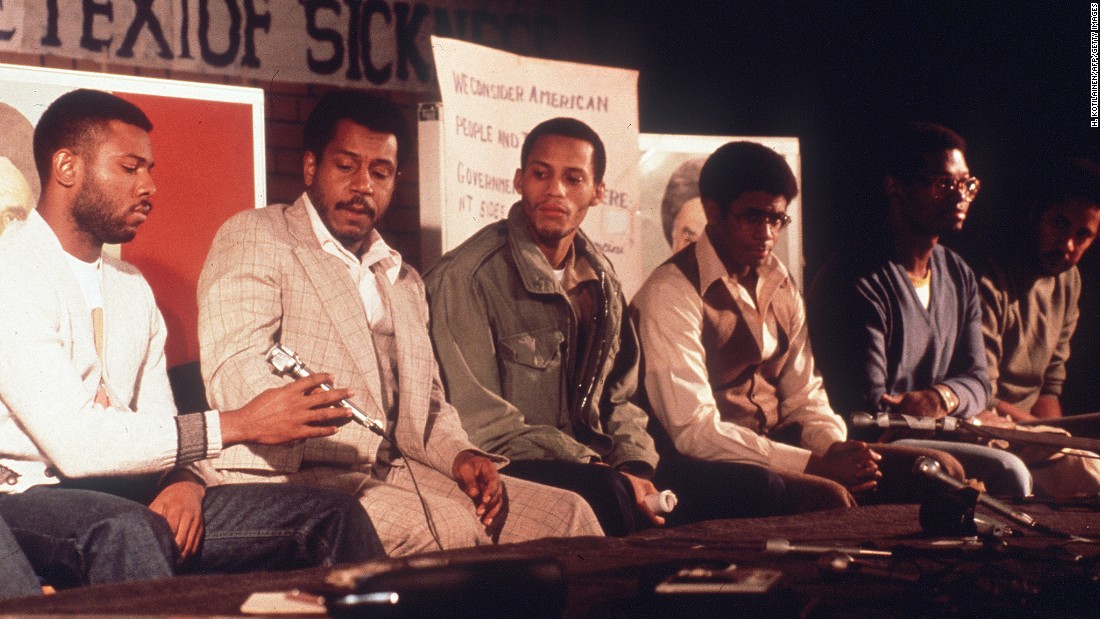
US Black hostages released by Khomeini in
November (he also released the women hostages as
well)
|
The disastrous rescue attempt in Iran (April 1980).
In an attempt to rebuild his reputation
(especially as he was facing a re-election bid that year), Carter
gambled on an attempt to rescue the American hostages with a Special
Forces raid on Teheran, the Iranian capital (Operation Eagle Claw). His
plan was to drop his Delta troops by eight helicopters outside of
Tehran, convey them by truck at night into a darkened Tehran (Americans
also having first shut down Tehran's electrical grid) to round up the
fifty-two American hostages at the embassy, and then fly them out of
the country.
The raid however turned out to be a total
disaster from the start and never got any further than just inside
southern Iran before it disintegrated in a combination of sandstorm and
mechanical failure of three of the helicopters, and, after the decision
to withdraw, the collision of another of the helicopters with one of
the six C-130 transport planes (involving the deaths of eight American
troops).
Now Carter's humiliation grew even worse – monumentally worse.
|
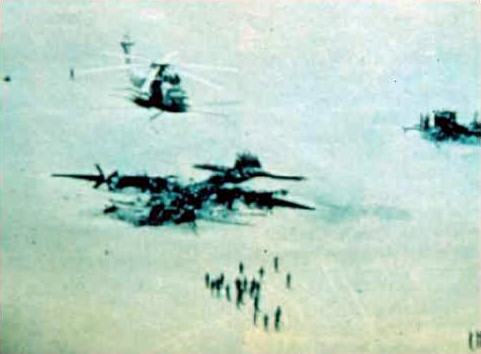
Wreckage at Desert One, Iran,
where eight Americans died – April 24, 1980
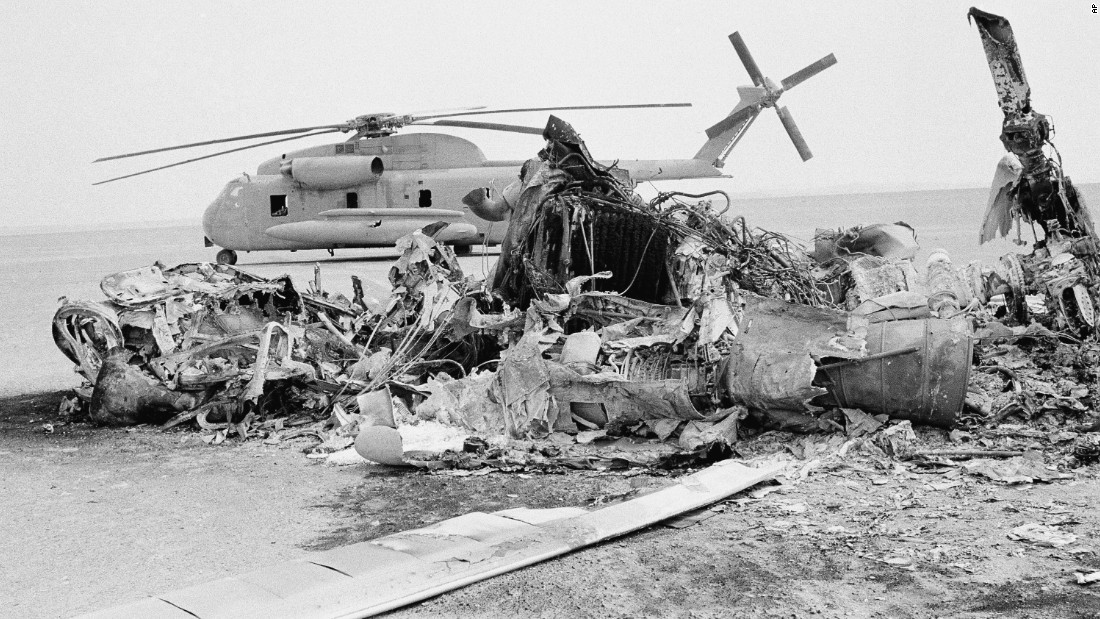
A burned-out and
abandoned US helicopter in Iran (Operation
Eagle Claw) 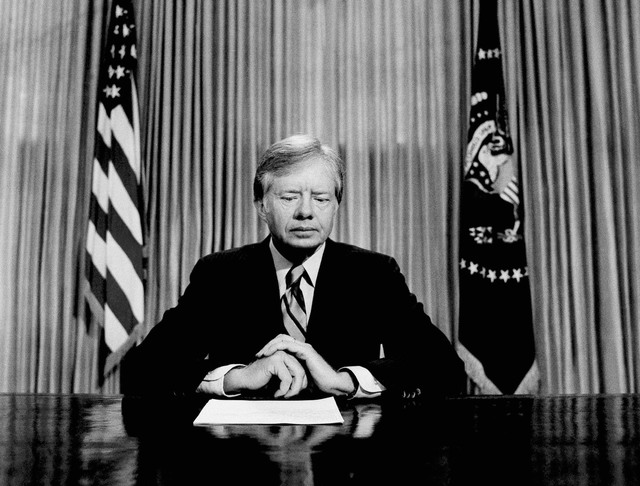 Carter ready to deliver a
nationally televised speech (April 25, 1980) announcing the failed rescue mission in
Iran
|
America was feeling the sting of failure
abroad and economic worries at home. The oil crisis had thrown the
economy into another recession of industrial slowdown and rising
unemployment, accompanied at the same time by an inflation set off by
fast-rising energy prices. Americans were hurting. The misery index was
rising rapidly as the summer election season was approaching, and
Carter was seeking re-election.
Carter's boycott of the Moscow Olympic Games
Carter only made the situation worse for
himself when he returned to his "moral politics" agenda and announced
that the United States would not be participating in the Moscow summer
Olympics (July 1980) if the Russians had not pulled out of Afghanistan
by then. It was a strange threat, for there was little likelihood that
the threat was going to result in anything except that American
athletes were not going to be able to compete in the big event they had
been training for (the Soviets returned the favor by boycotting the
1984 summer Olympics in Los Angeles). In the end it made Carter look
petty and desperate. It only worsened his image as a national leader.
VOLCKER'S "MONETARISM" TO THE RESCUE? |
|
"Stagflation" (Economic Stagnation and Financial Inflation)
But ultimately what guaranteed that the Carter
presidency would be a one-term presidency was the economy. Carter's own
appointed Federal Reserve Chairman Paul Volcker decided in the latter
part of 1979 to attack the high inflation set loose by the huge
three-fold oil price hike (caused by Iran's withdrawal from the
international oil market) – and the need of the rest of the industrial
economy to raise prices on their products in order to maintain some
degree of profitability in the face of the new energy costs. Volcker
decided that he was going to solve the problem of runaway inflation –
by the Federal Reserve's putting into play a huge tightening of
America's dollar reserves, driving interest rates astronomically high.
He believed that this would indeed kill inflation (if it didn't also
destroy the American economy!).
Thus by cutting back severely the amount
of dollar reserves available for lending to America's banks, Volcker
drove the Federal Reserve discount rate all the way to 20 percent, in
turn forcing the large commercial banks (all of whom borrowed from the
Federal Reserve to maintain their own supply of lending power) to have
to set their prime rates at 21.5 percent, for even their best
industrial customers. This strategy Volcker called "monetarism."
Volcker's "monetarist" (tight money)
strategy was designed to make Americans feel poor enough that they
would stop spending, and thus presumably force down prices, and
supposedly inflation with it. This was also supposed to strengthen the
dollar. At least that was the theory Volcker was supposedly working
under.
What this actually meant was that
industrial enterprises, facing a three-fold increase in their energy
costs in their operations, now found themselves also having to make
huge interest payments on the bank loans on which their businesses
depended. To survive at all, to meet skyrocketing operating costs (now
both energy and interest expenses), they were forced to have to raise
(not lower!) prices on their products quite considerably – to make
enough money just to barely stay in business. In short, Volcker's
monetarist strategy served to drive inflation even further upward.
But far worse, with car loans and house
mortgages borrowed from American banks now running at Volcker's new
rates (forcing the banks' 30-year mortgage rates to run at about 16
percent and industrial prime lending rates up to 21 and 22 percent),
Americans decided to hold off buying a new car or buying that new home.
Thus now with few customers coming through their doors, businesses
found themselves in deep trouble. Soon these businesses began to shut
down, one by one.
Consequently, everywhere the economy not only slowed down, as Volcker intended, it plunged downward in a death spiral.
But Volcker was determined to hang tough
until he single-handedly had "shaken the last of inflation out of the
economy" (or so he said). That was except for the brief period over the
summer of 1980 when Volcker dropped interest rates, to release the
economy from his imposed restraints and thus get it up and moving again
in time to get Carter re-nominated to the Democratic Party ticket. The
economy immediately responded by picking up again.
But before the November elections rolled
around, Volcker decided to take the interest rates right back up again,
plunging the economy back into deep recession, which in turn had the
Americans going to the polls feeling very grumpy. This helped produce a
very humiliating Carter defeat in the 1980 general elections.
But tragically Volcker's monetarist
strategy also helped worsen what were at this point already shaky
American heavy or basic industries (steel, chemicals, cloth,
construction), forcing many businesses either to shut their doors,
never to reopen, or go "offshore" with their operations (to Japan,
India, Thailand, etc.), never to return to America.
And banks, at first making huge windfall
profits on the basis of the new interest charges imposed on their
customers, soon found that they too were losing customers – as no one
came to the banks looking for mortgages or car loans.
And commercial and industrial
bankruptcies were not what the banks wanted either. Commercial
bankruptcy now got pushed onto the creditor banks who had formerly
funded these now-bankrupt companies more than they were now worth.
True, the banks received title to these bankrupt companies. But what
were the banks to do with these companies? They could not sell them to
investors willing to take them off their hands. There were no such
investors willing to take on the financing necessary to purchase even
these bankrupt companies. Thus it was that American banks now found
themselves also in debt. They could, of course, borrow from the federal
reserve. But what bank was foolish enough to take on federal reserve
loans running at times almost at 20 percent interest? Within short
order, American banks also began to fail one by one.
Thus it was that the only thing that
Volcker's monetarism actually achieved was first the ruination of the
American industrial sector and then the collapsing of much of America's
financial sector as a follow-up.
America now fell into a deep recession,
one that American businesses and consumers had no idea of how to climb
out of. Certainly Volcker's federal reserve bank was of no help in
addressing the problem. At this point it was one of the chief causes of
the problem!
|
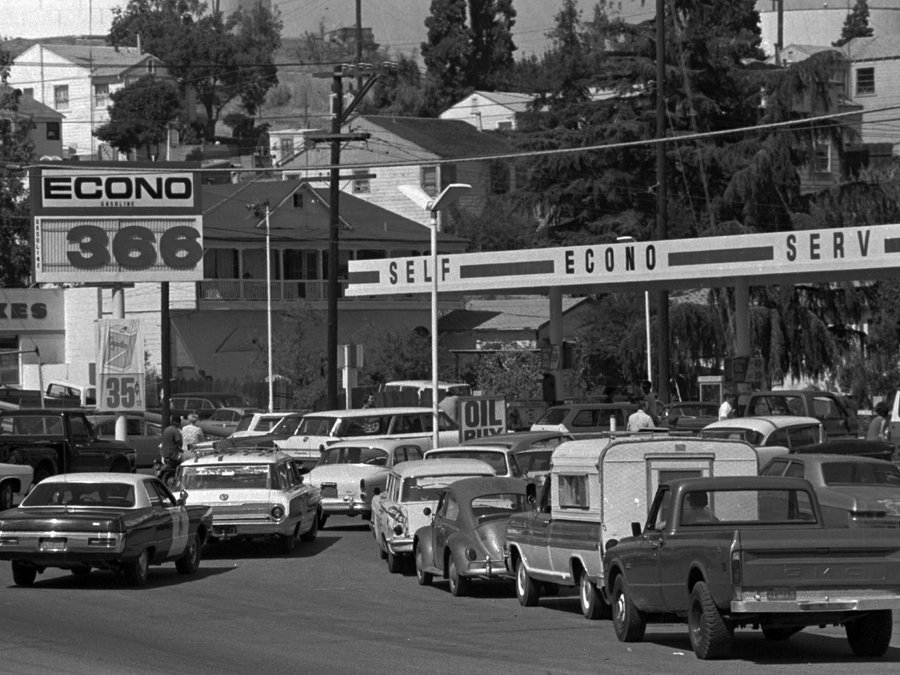
Once again ... long lines to the gas pumps
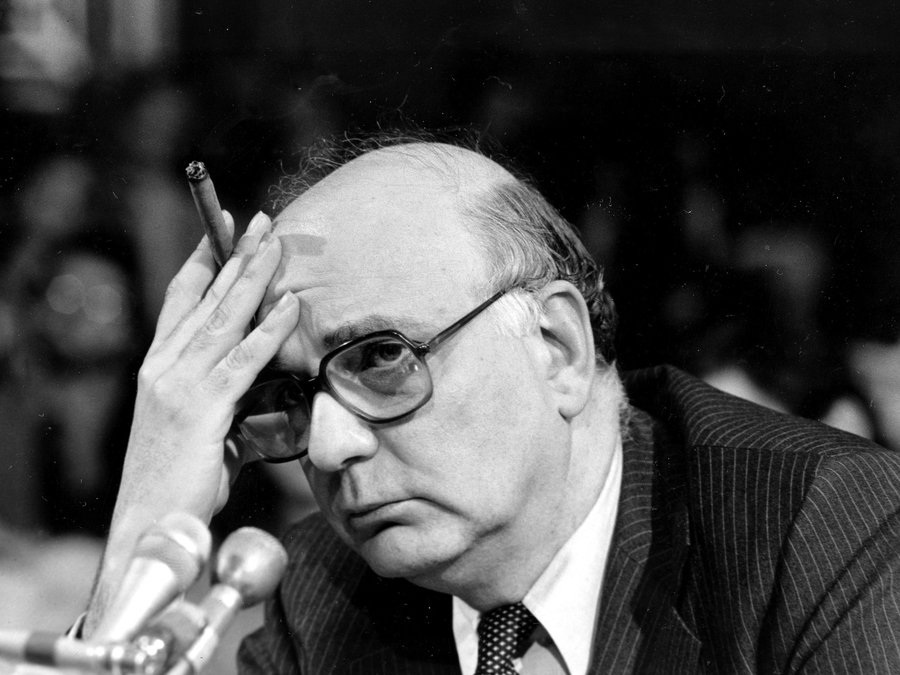 Federal Reserve Chairman
Paul Volcker
Federal Reserve Chairman
Paul Volcker
IN THE MEANTIME, A NUMBER OF OTHER POLITICAL
CAUSES CONTINUE TO ADVANCE WITHIN AMERICA ITSELF |
Environment versus Energy
priorities create a festering sore 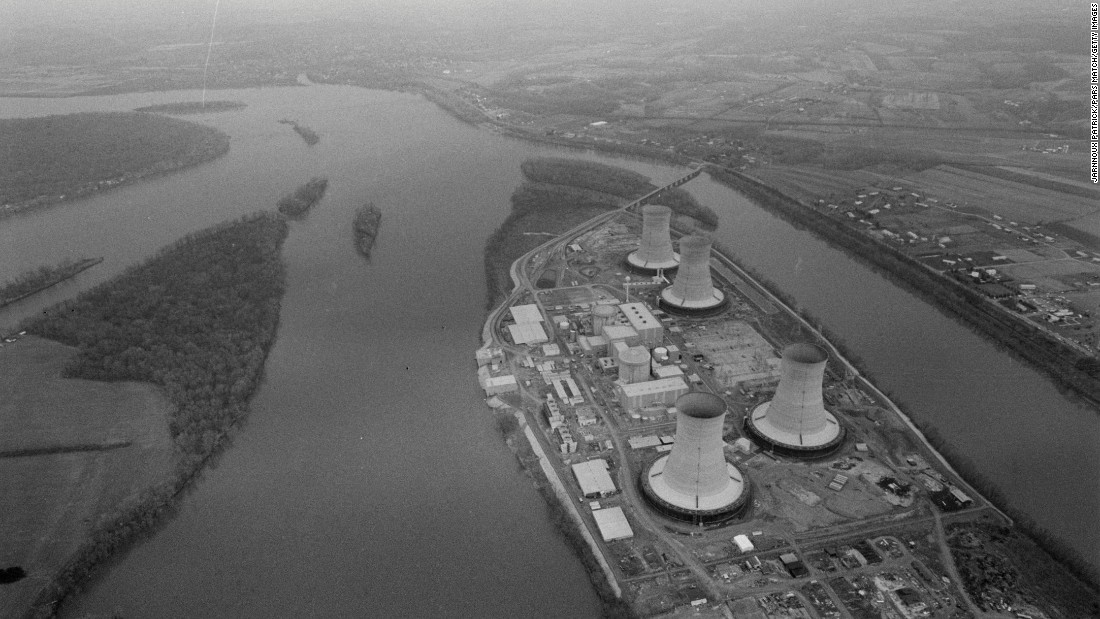
On
March 28, 1979, large amounts of reactor coolant and radioactive gasses were released into
the atmosphere, forcing the abandonment in a 20-mile radius of 140,000 people from their
Pennsylvania homes. Cleanup took four years ... and greatly advanced the cause of
the anti-nuclear protest groups. 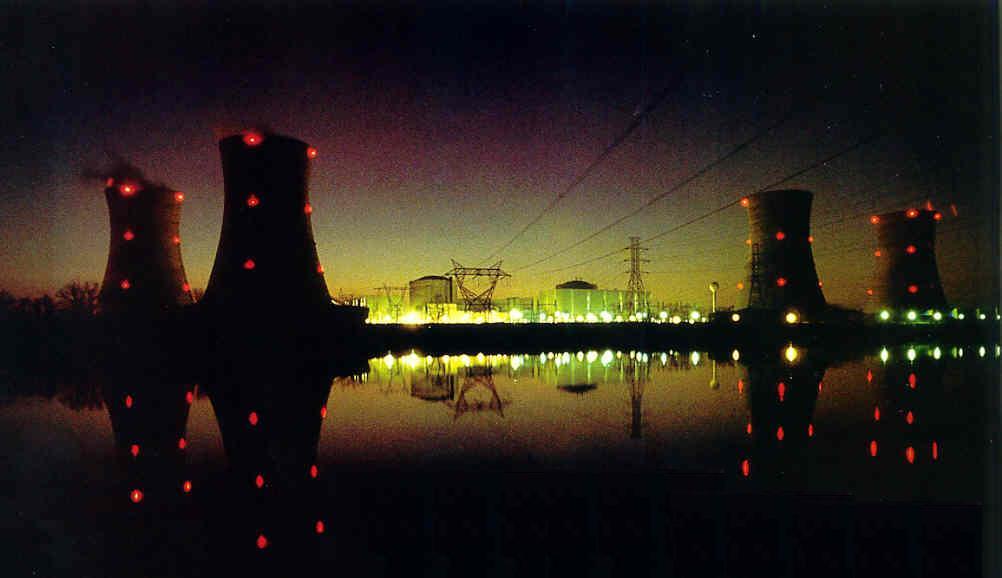
The shut-down Three-Mile Island
nuclear
power plant – April 1979
A tragedy that had nothing to do with American politics was the Jim Jones massacre in Guyana
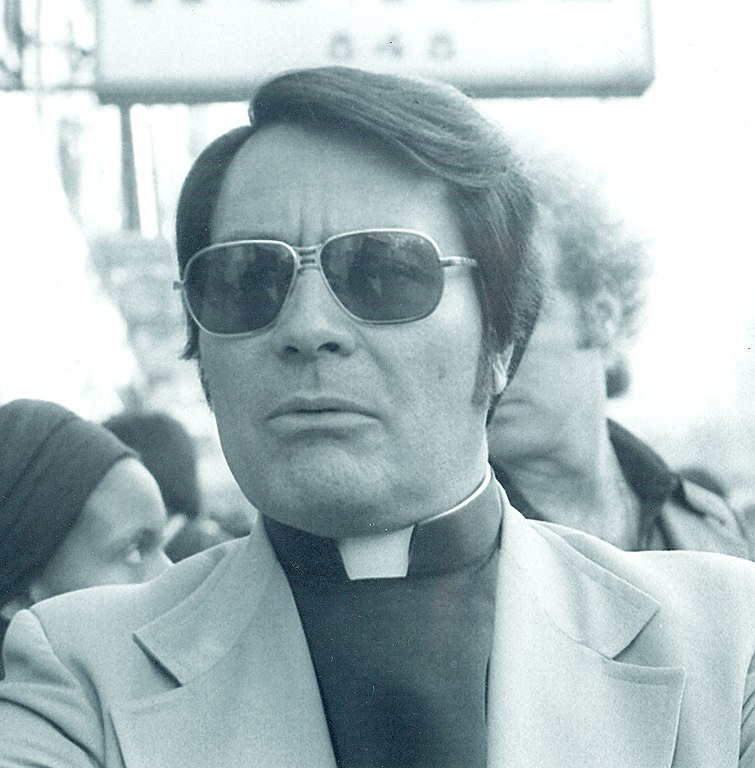
The "Christian" cult leader Rev. Jim Jones (mid 1950s to November 1978)
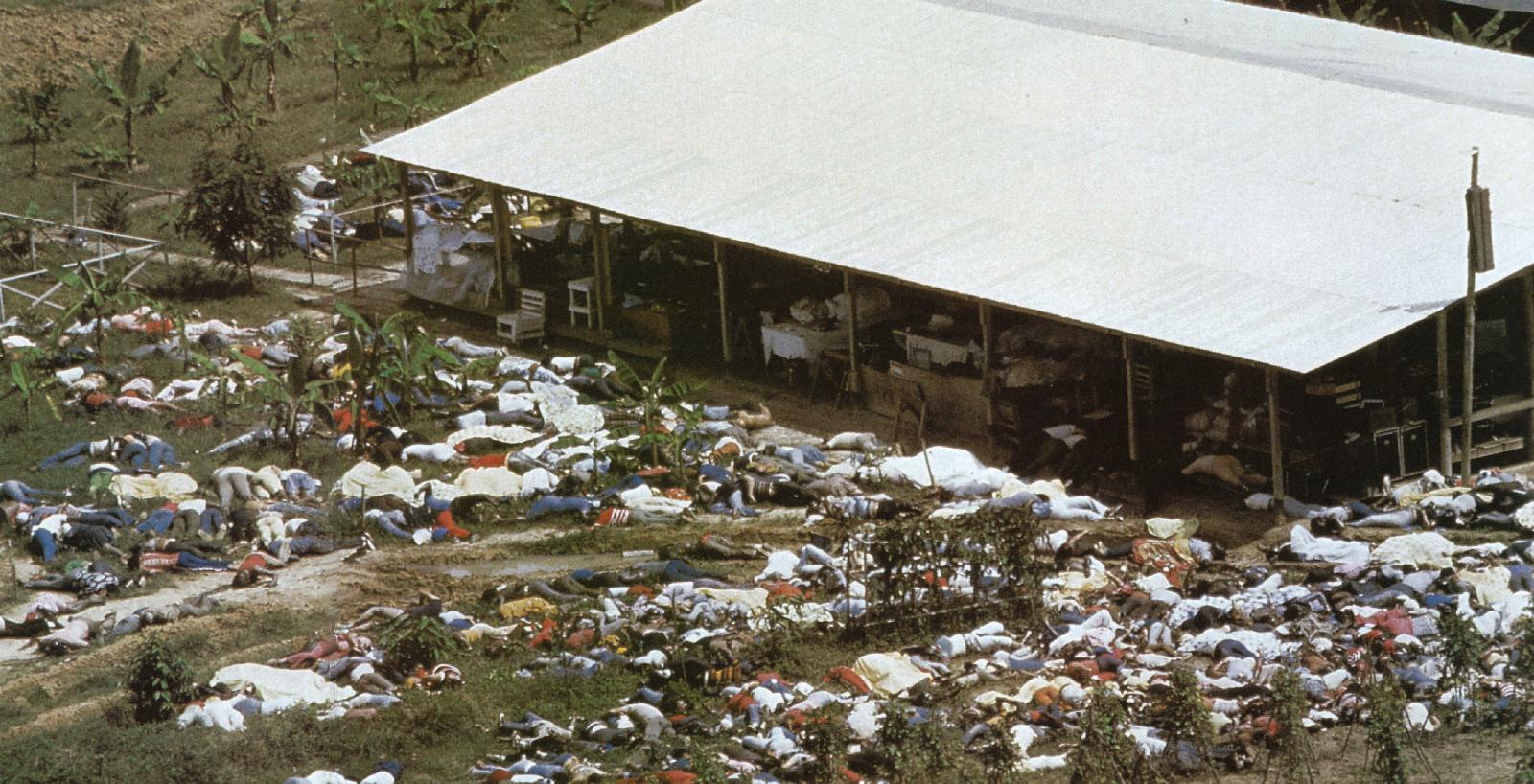
900 dead of self-inflicted (or forced) cyanide (grape-flavored "Kool-Aid") poisoning at the "Peoples
Temple" at the Jim Jones Compound, "Jonestown" November 1978 ... ordered by the cult leader
Jim Jones (he took his own life in the process as well). Also killed (shot) were US Congressman
Leo Ryan and several news reporters as they were leaving the area following a visit to investigate
rumors of massive abuse.
The program was a Jones-developed offshoot of a "Christian socialism" program which originated
in Indianapolis, Indiana ... which extolled the social virtues of living in a "communal" world similar to
the Soviet world (which Jones constantly extolled and even gifted lavishly financially).

Go on to the next section: A Deepening Cultural Split
 Miles
H. Hodges Miles
H. Hodges
| | | |


 The American Bicentennial – 1976
The American Bicentennial – 1976
 Jimmy Carter and the national elections
Jimmy Carter and the national elections Carter proposes a foreign policy of
Carter proposes a foreign policy of The surrender of the Panama Canal
The surrender of the Panama Canal
 Other international issues during the
Other international issues during the American diplomats imprisoned in Iran
American diplomats imprisoned in Iran
 Volcker's "monetarism" to the rescue?
Volcker's "monetarism" to the rescue?
 Other political causes continue to
Other political causes continue to



















































